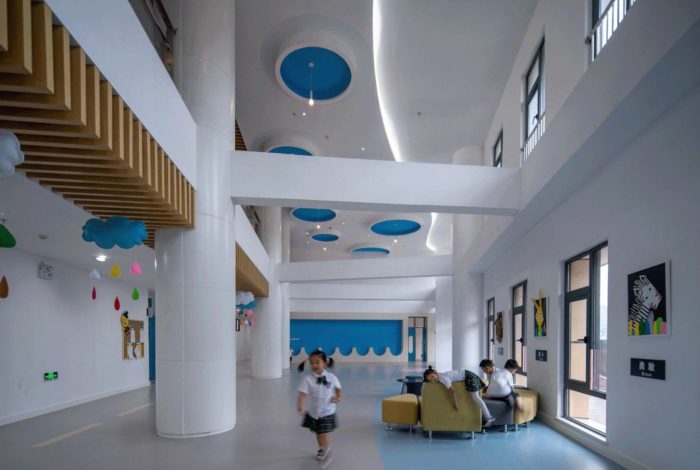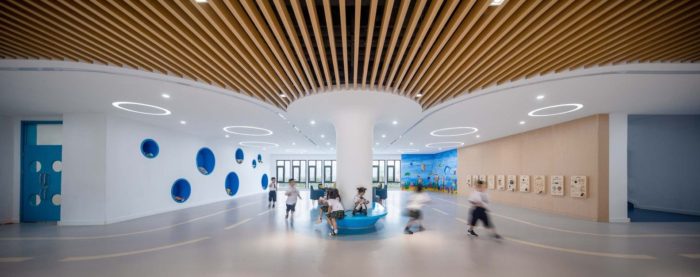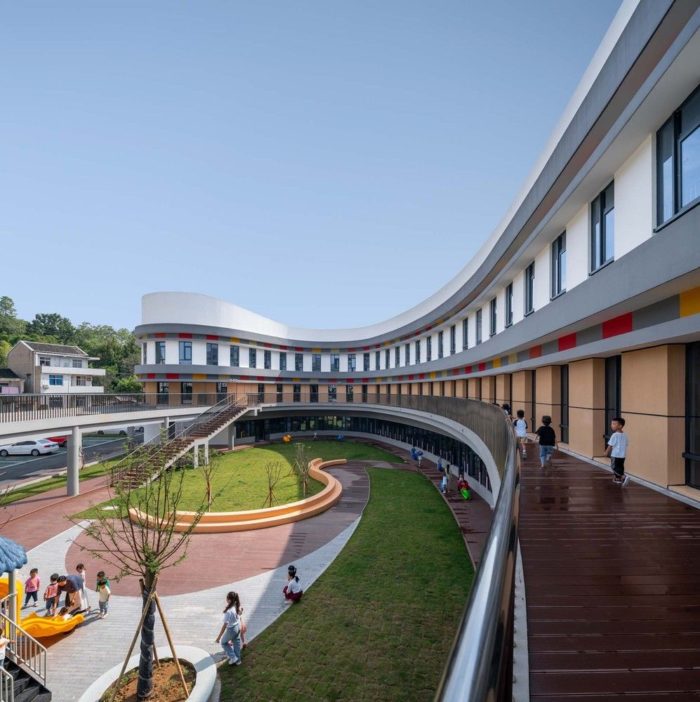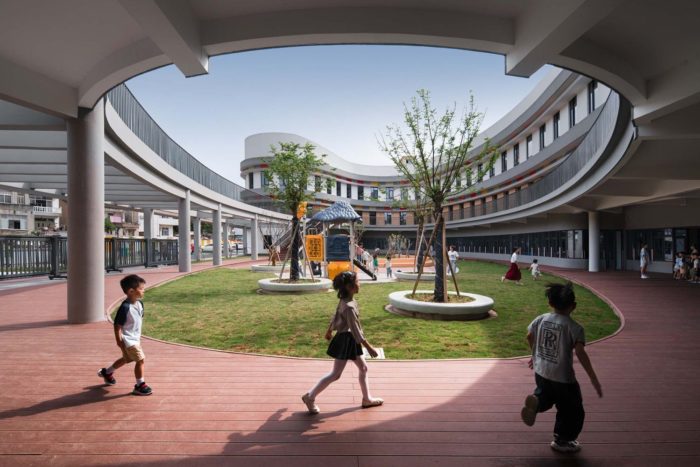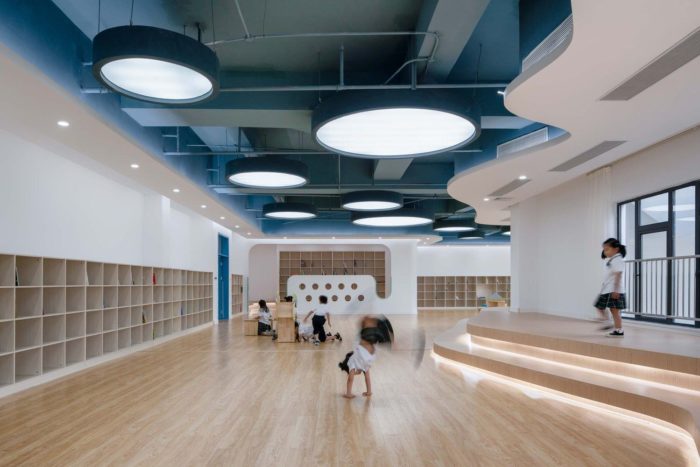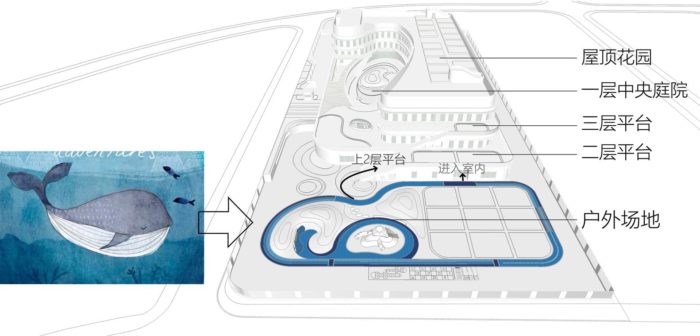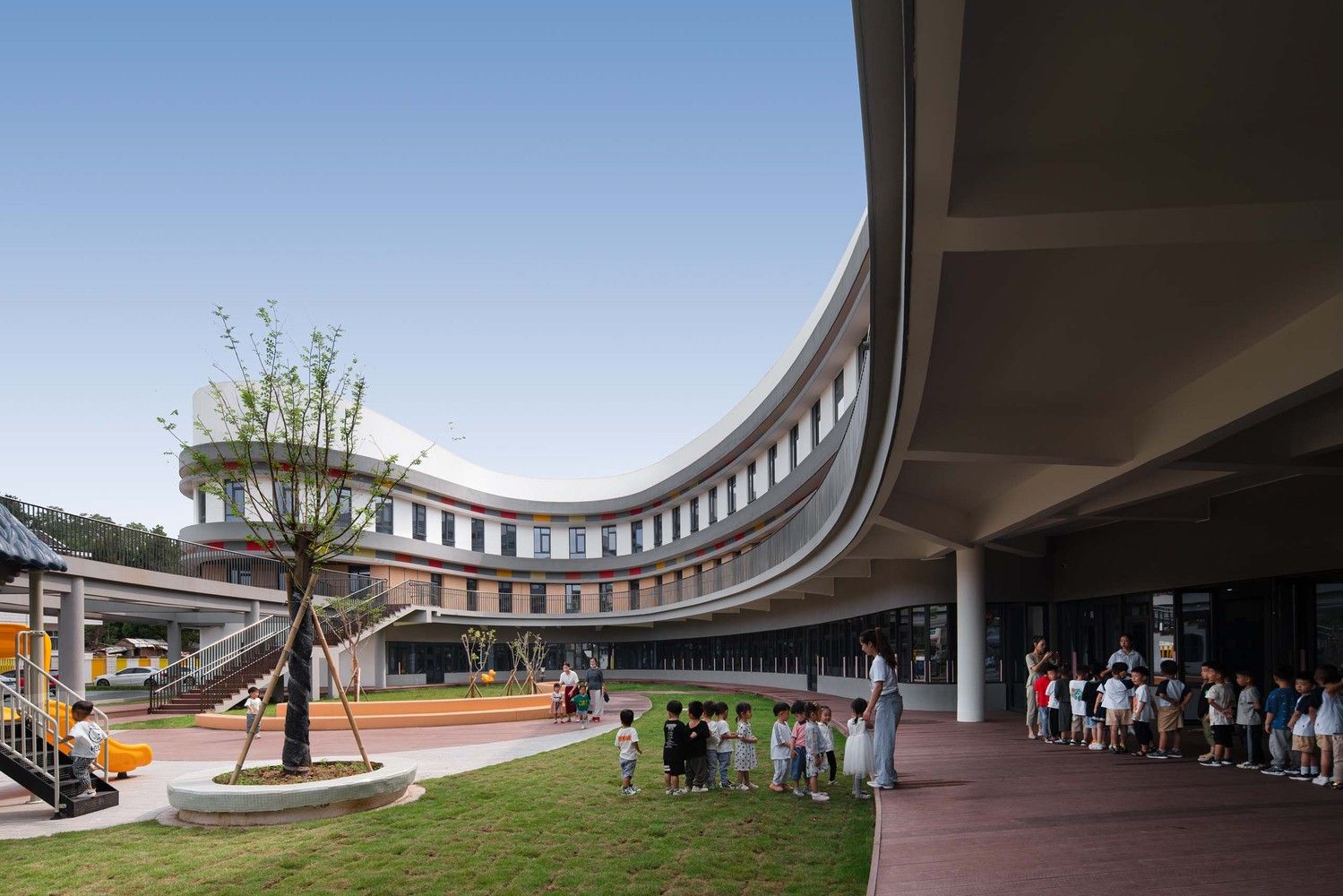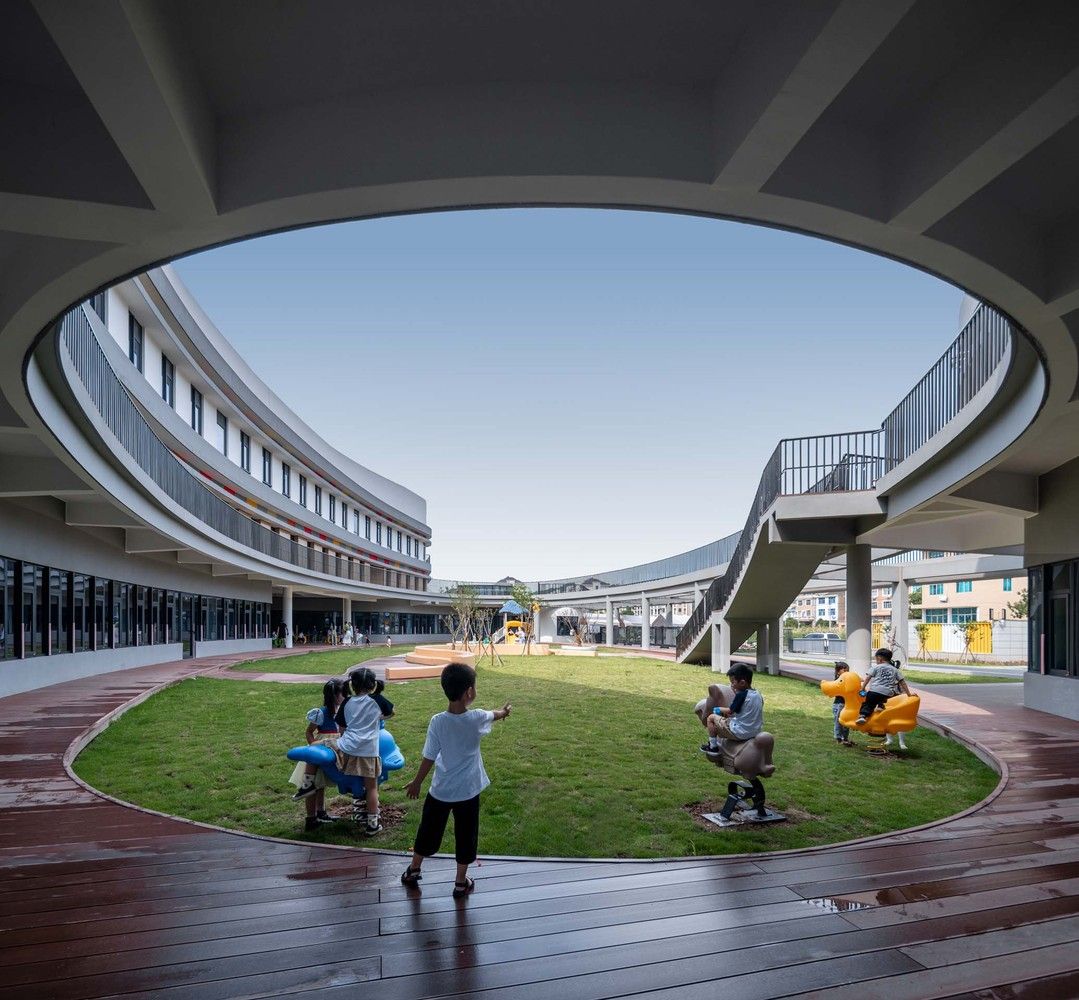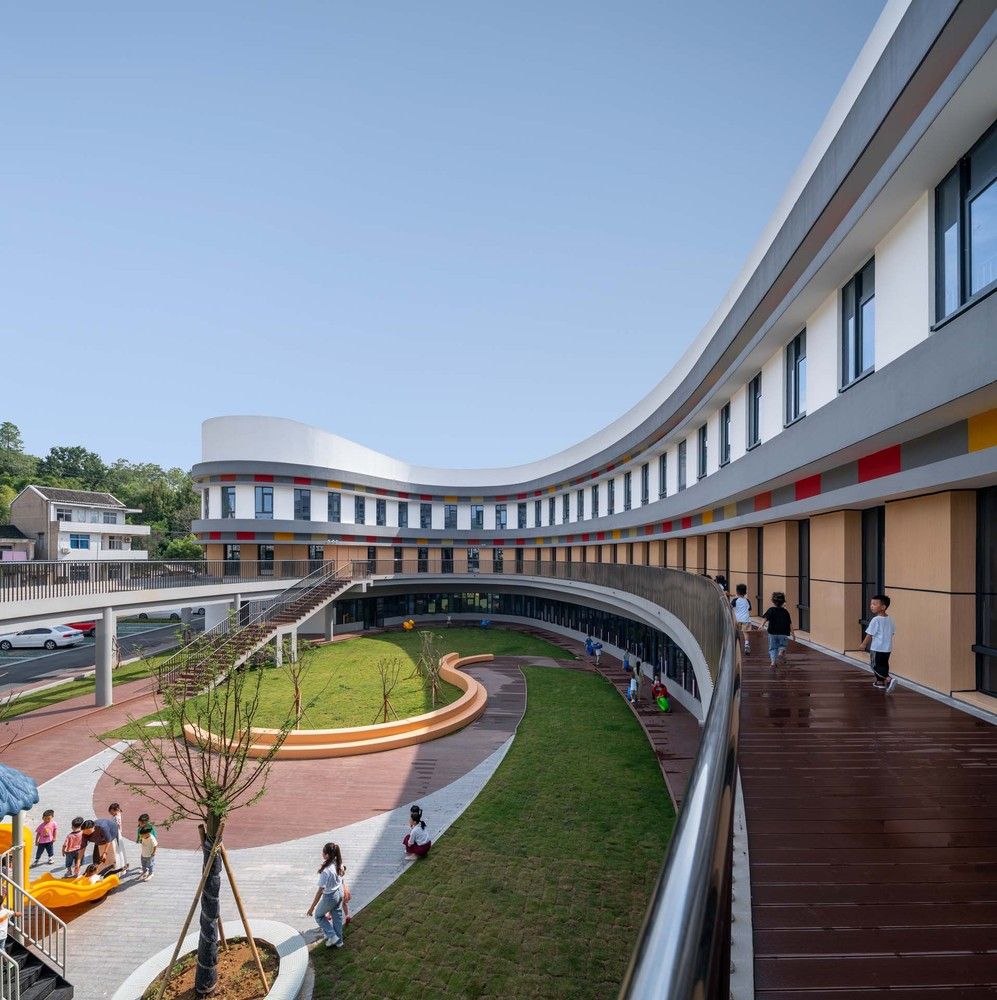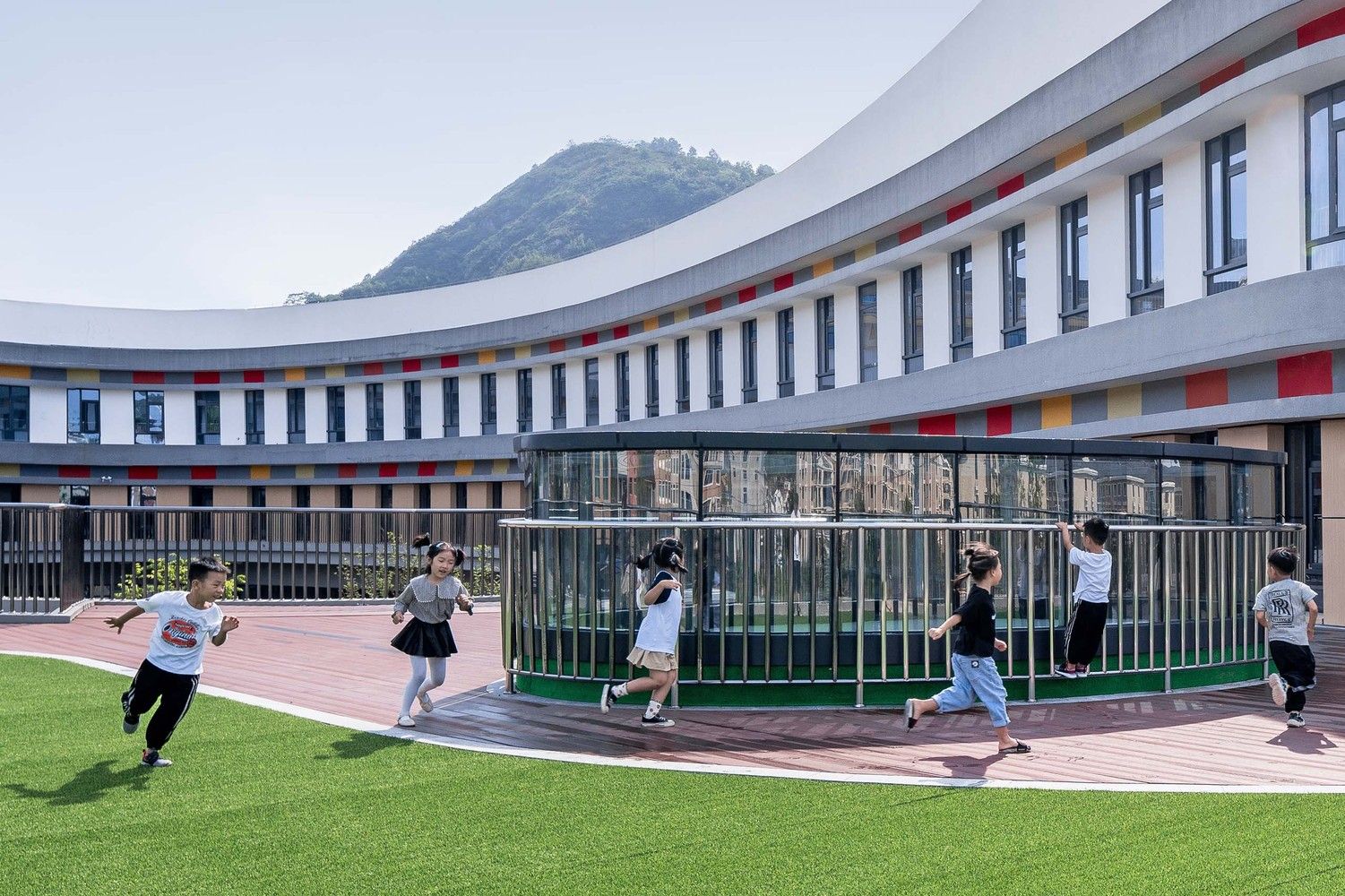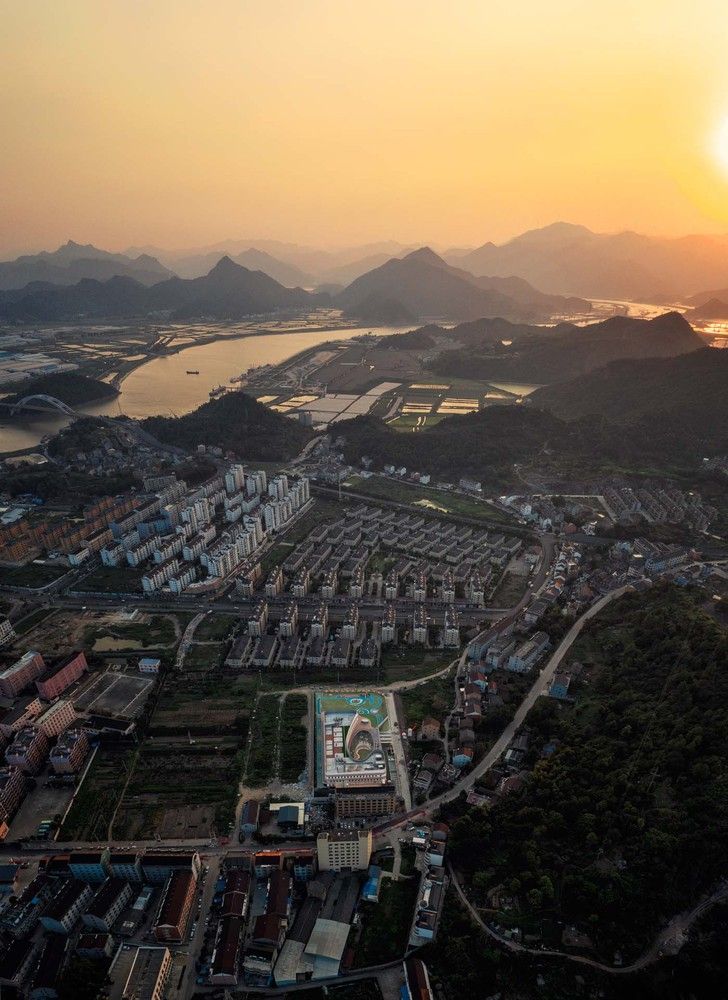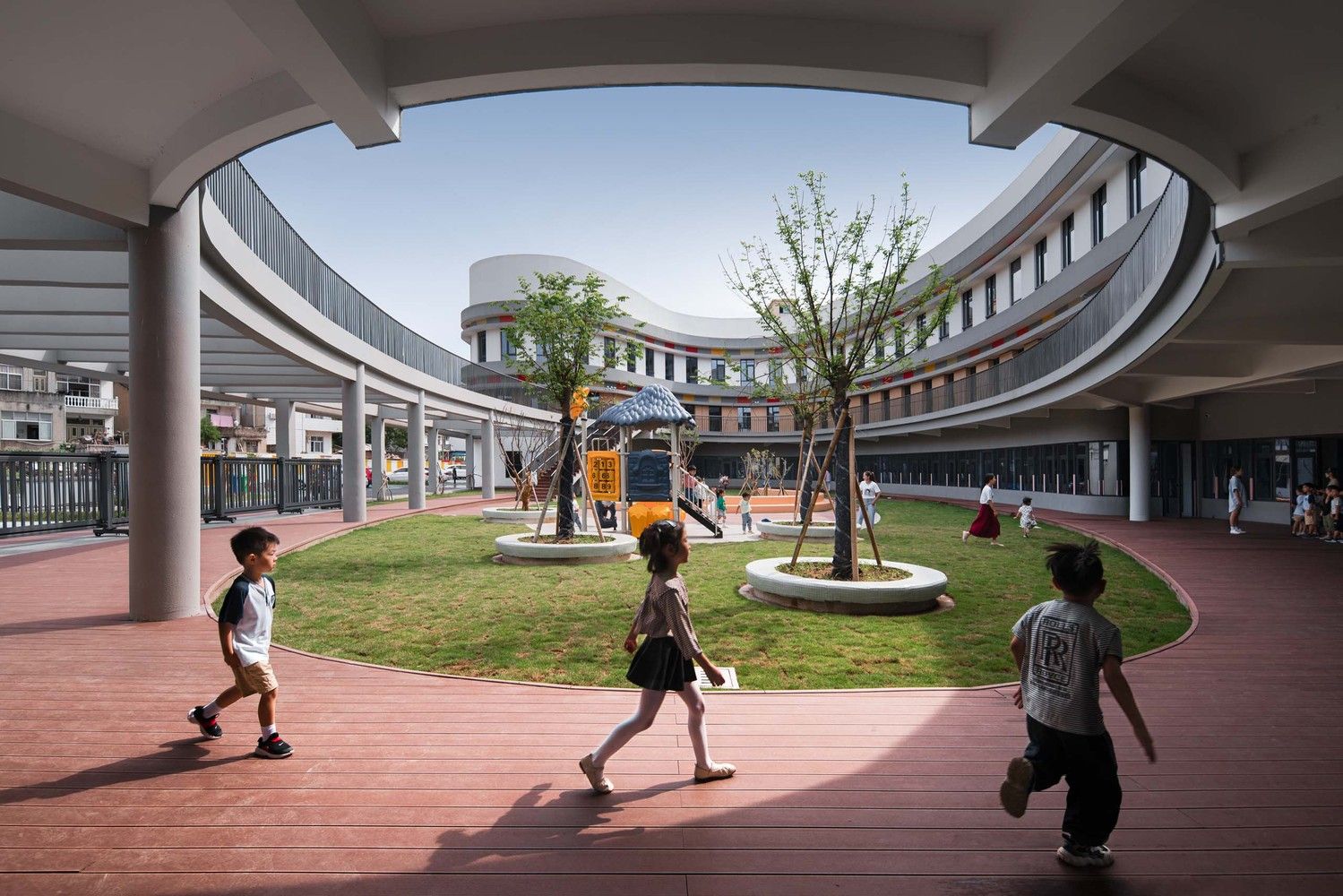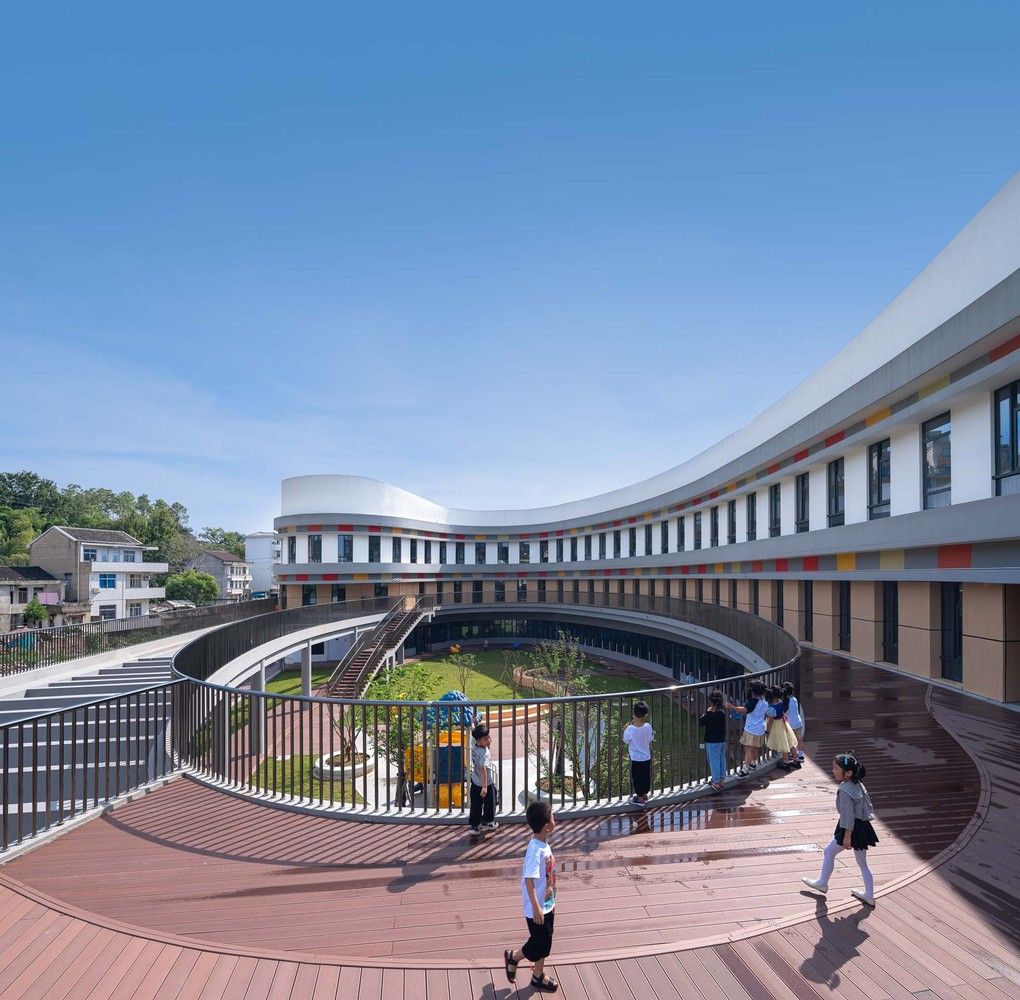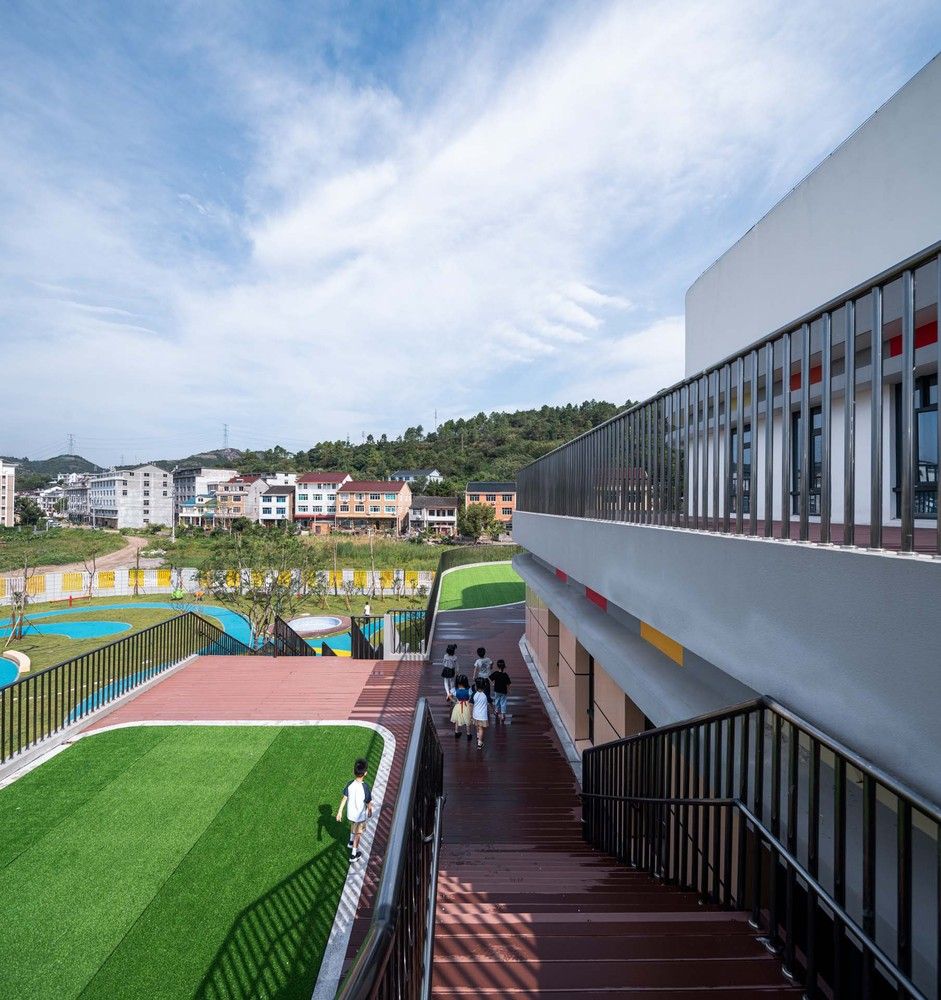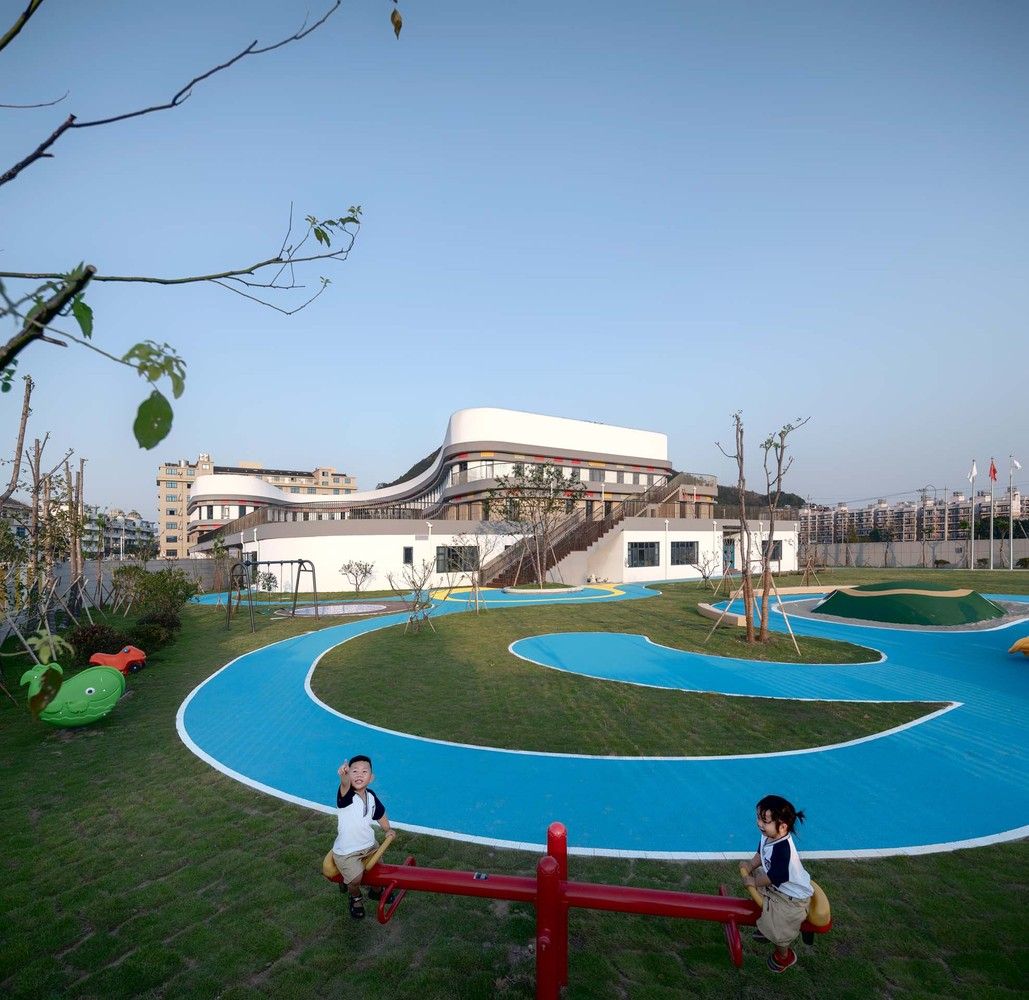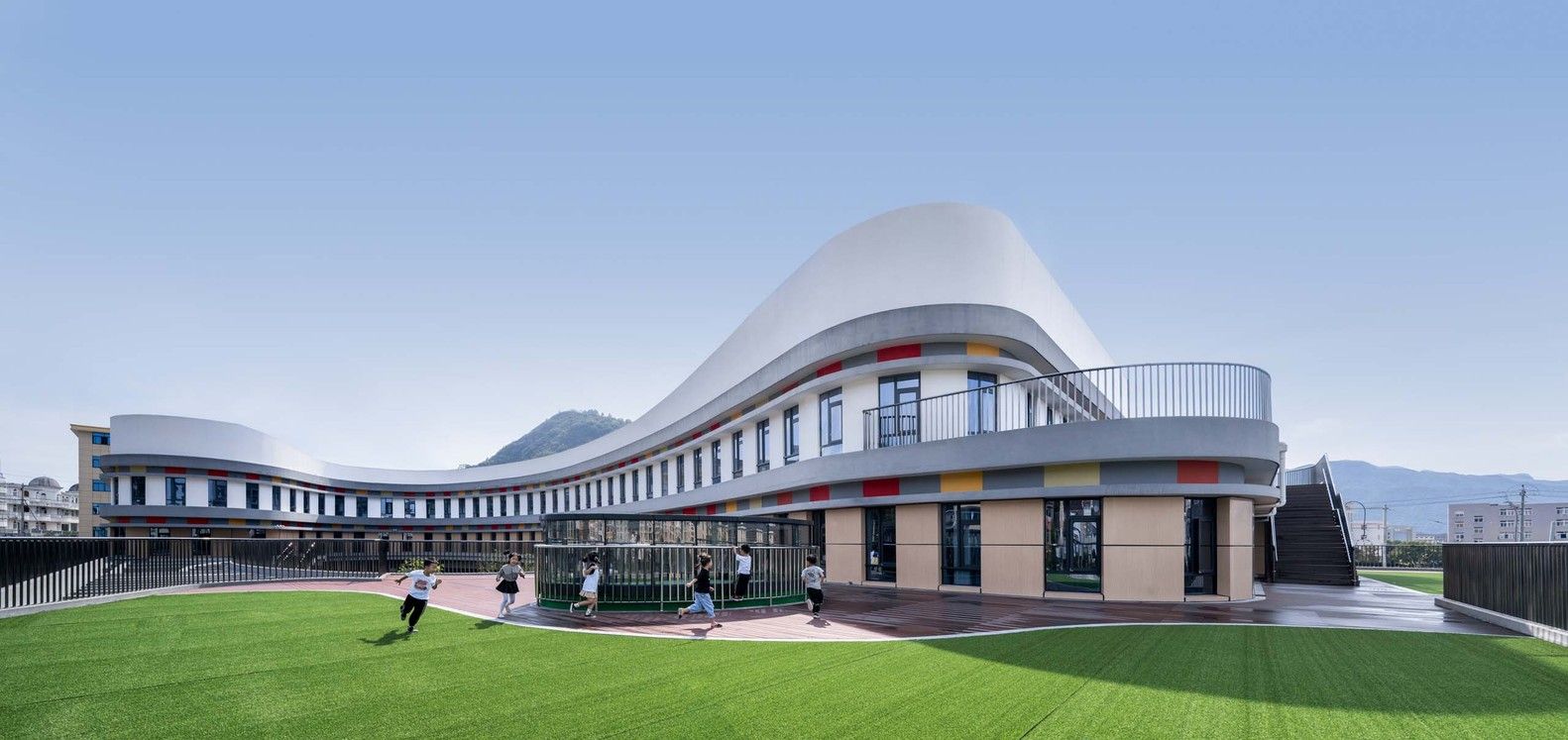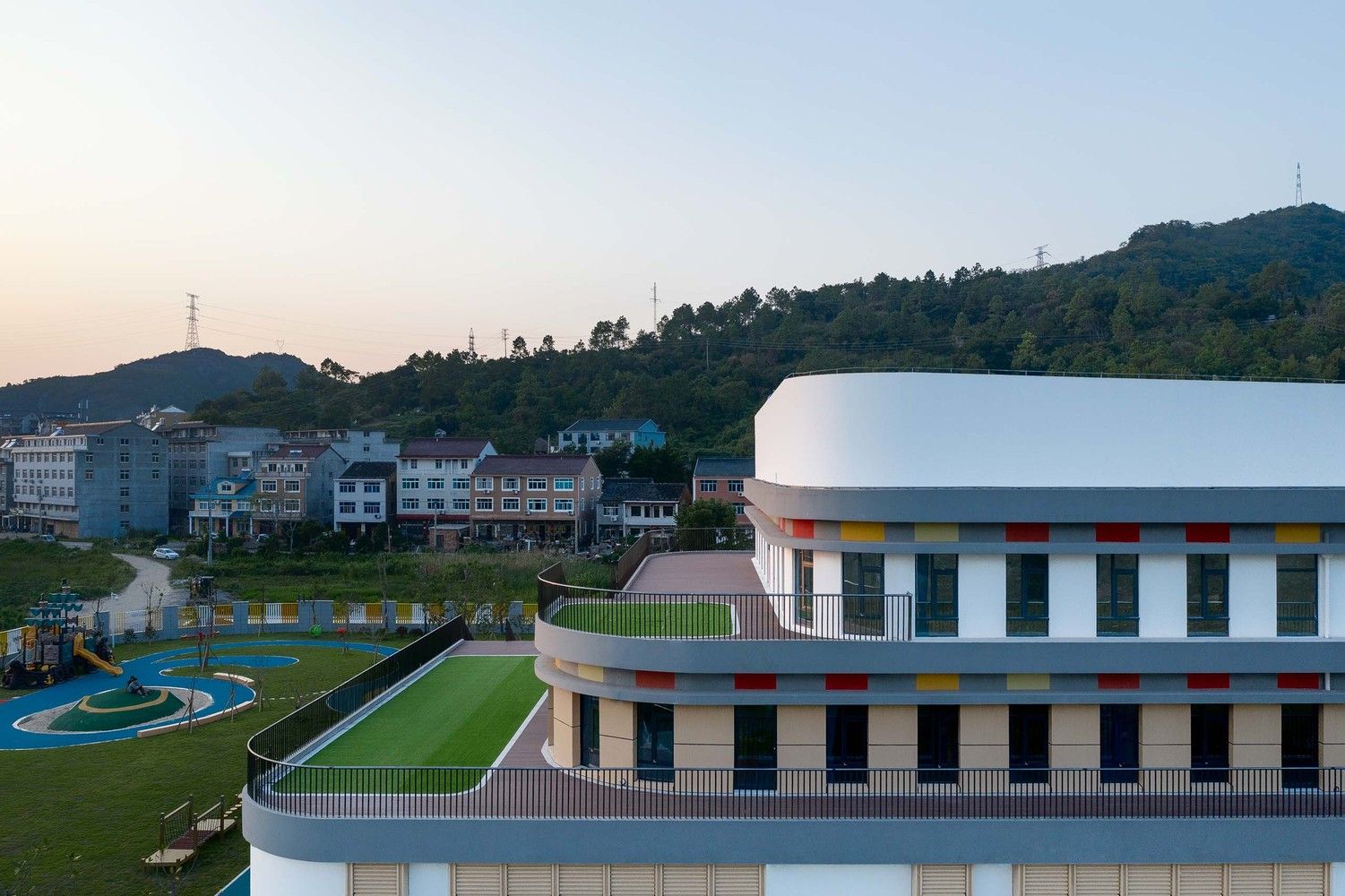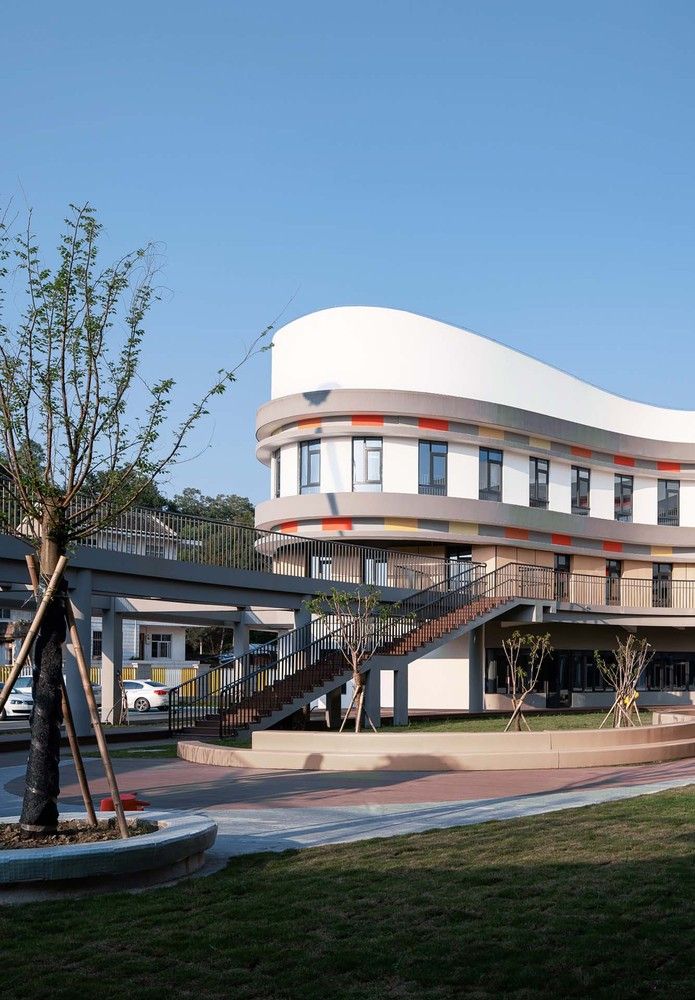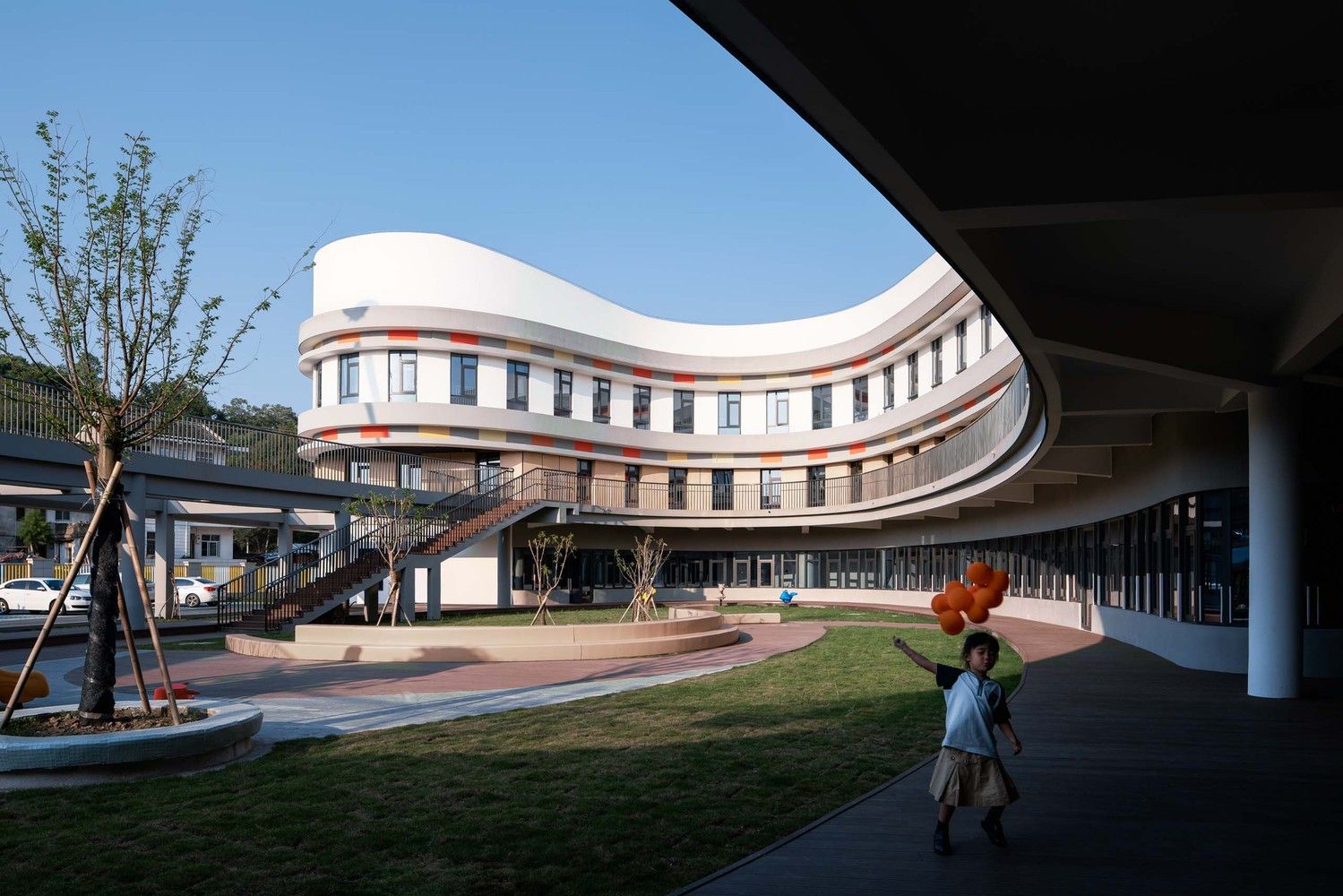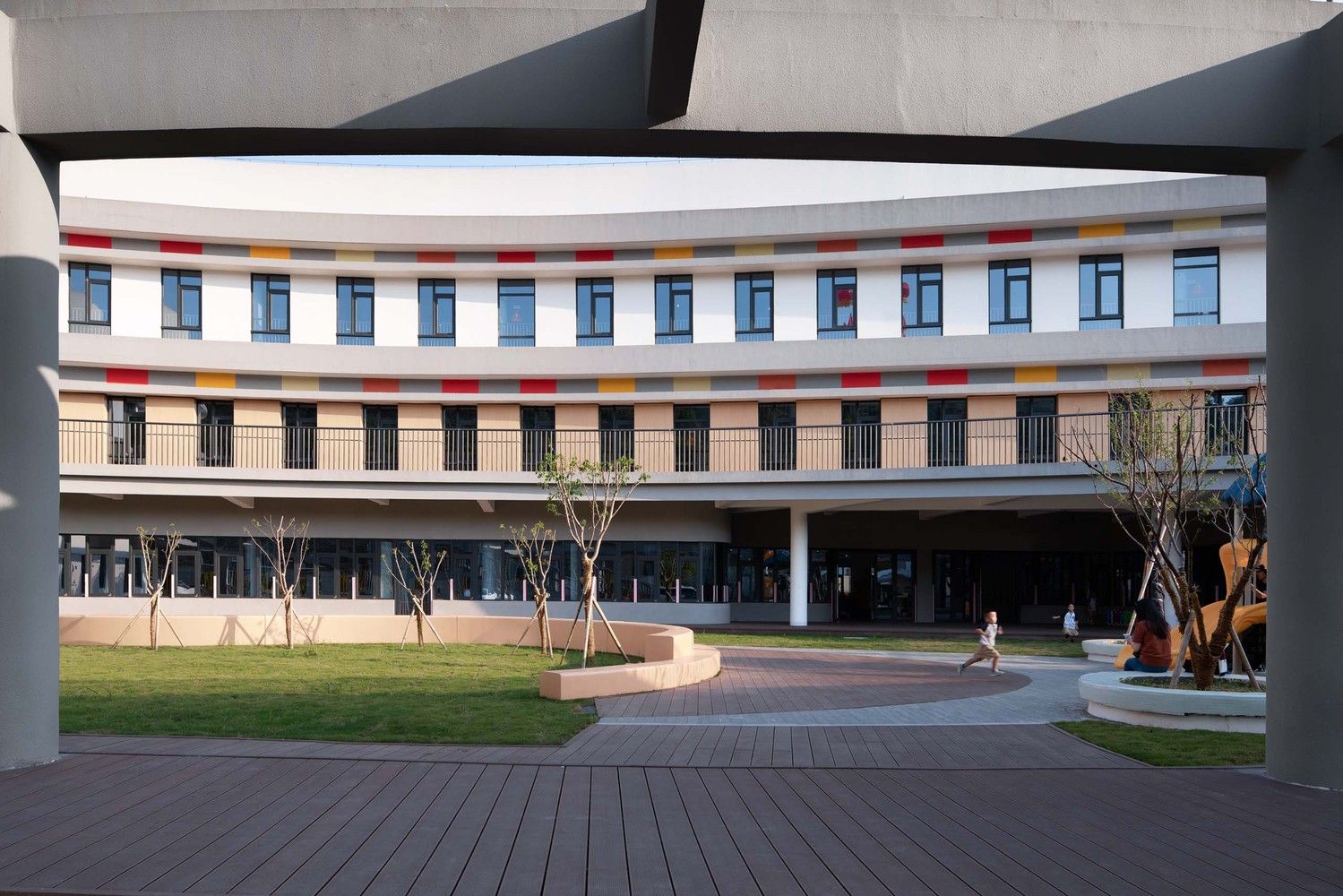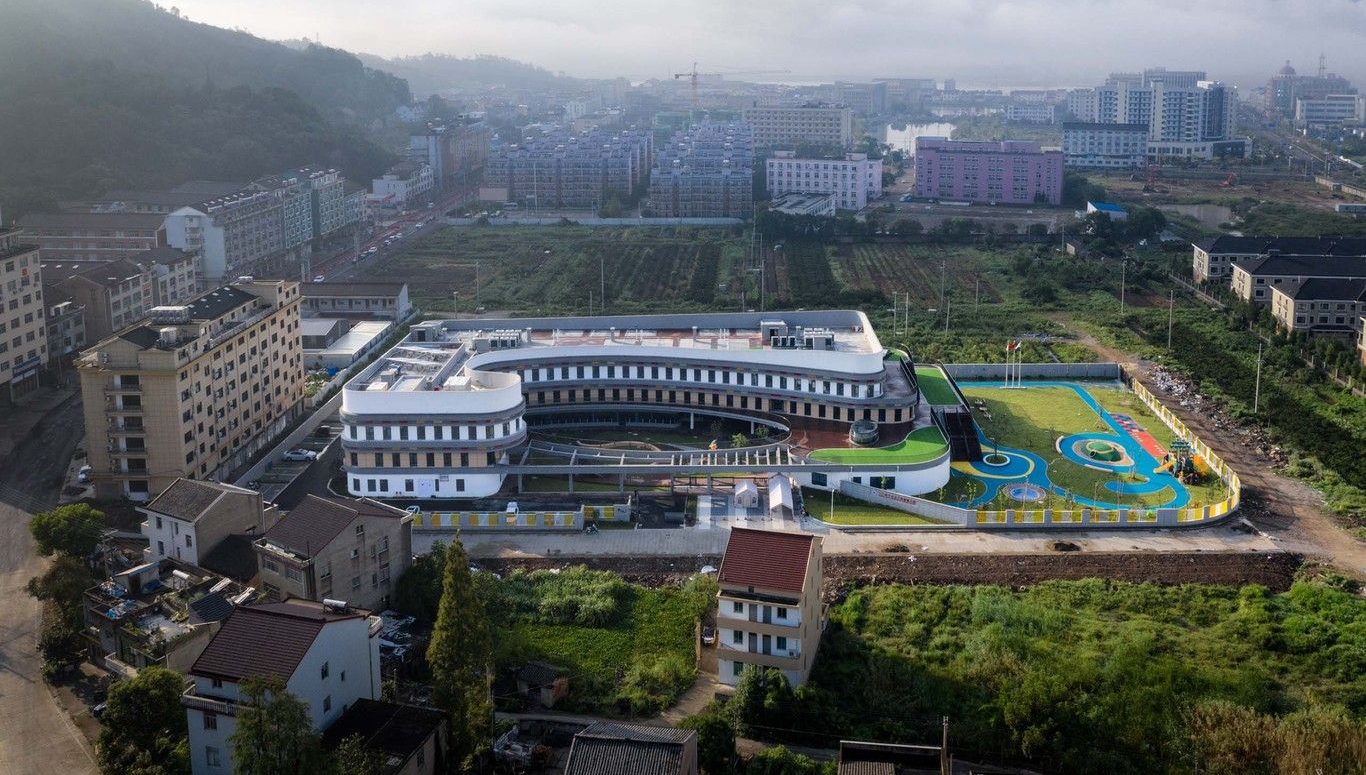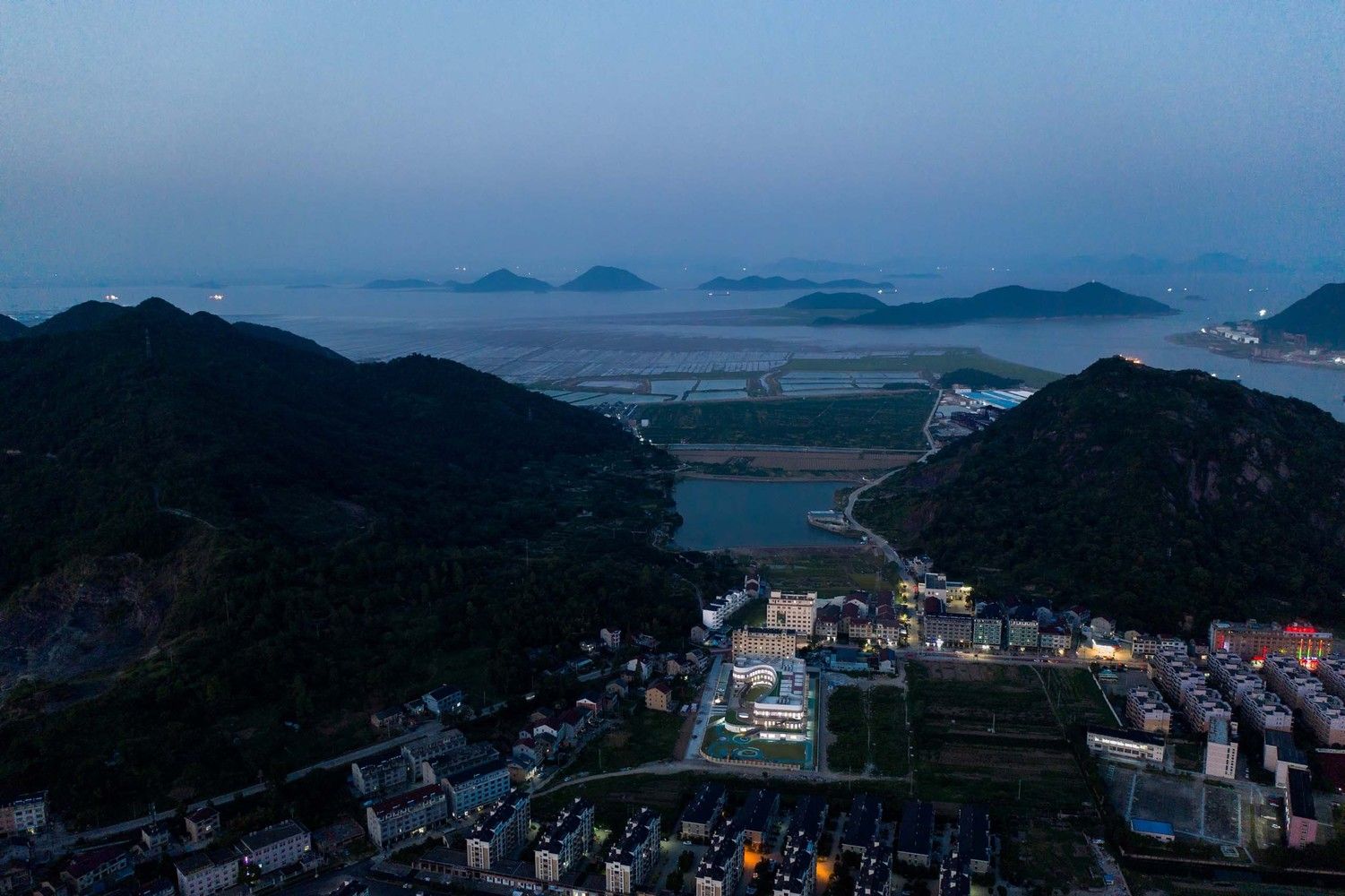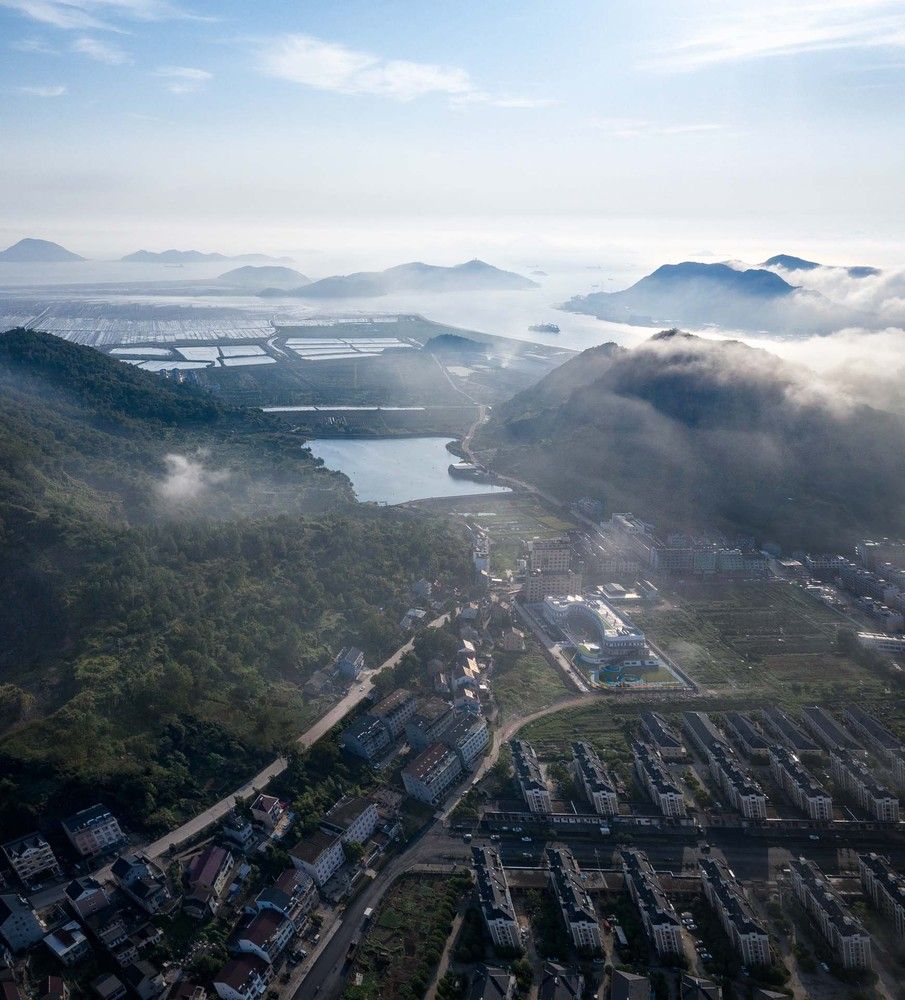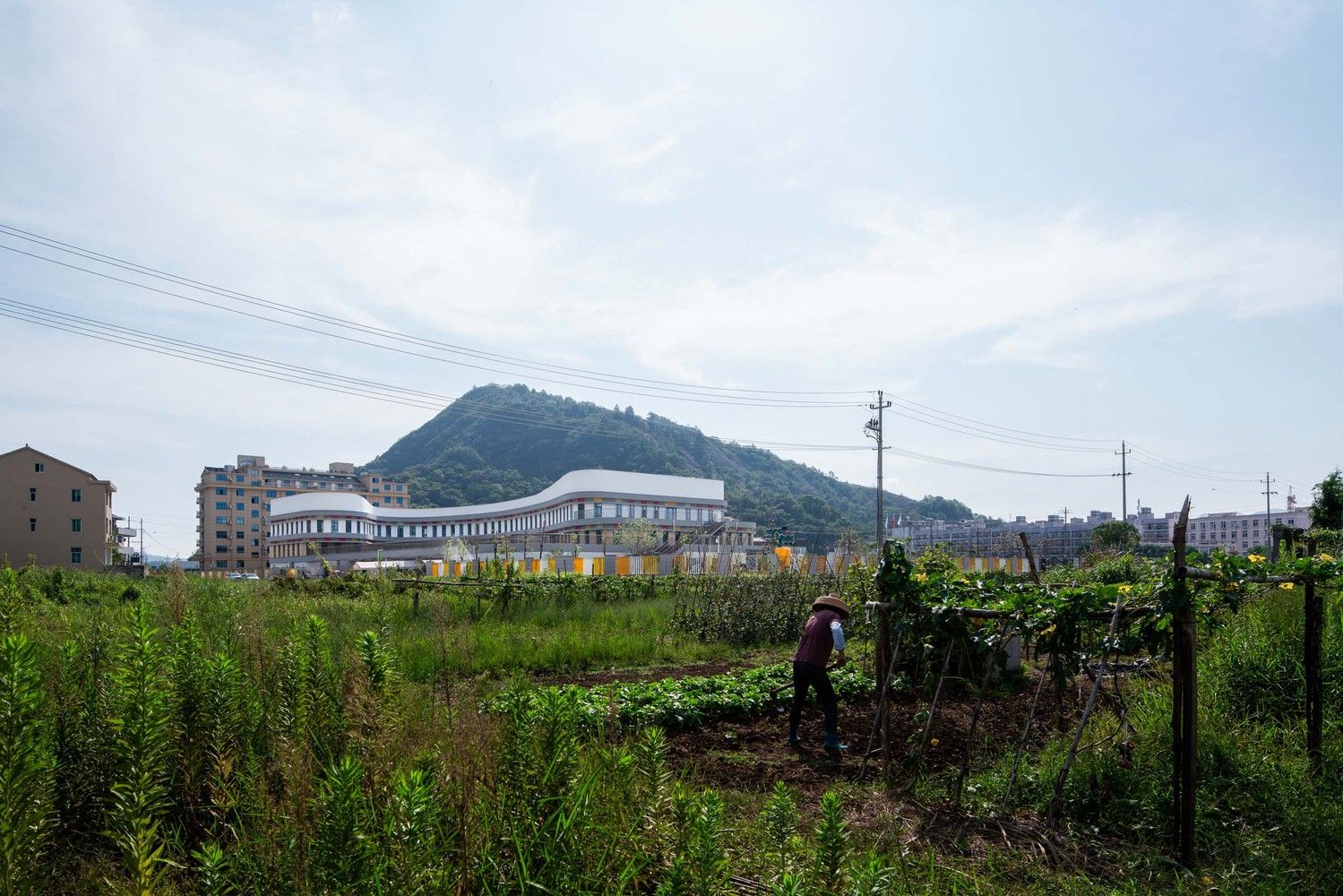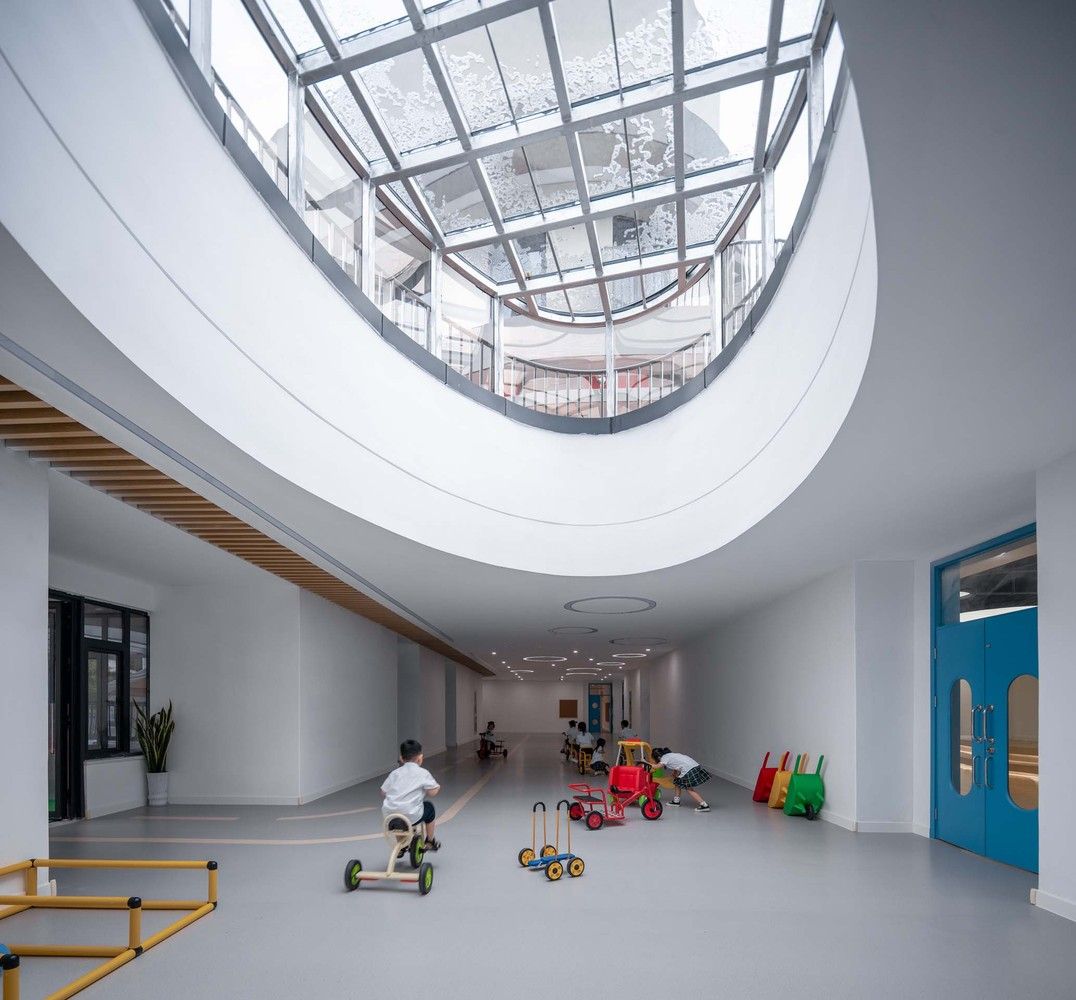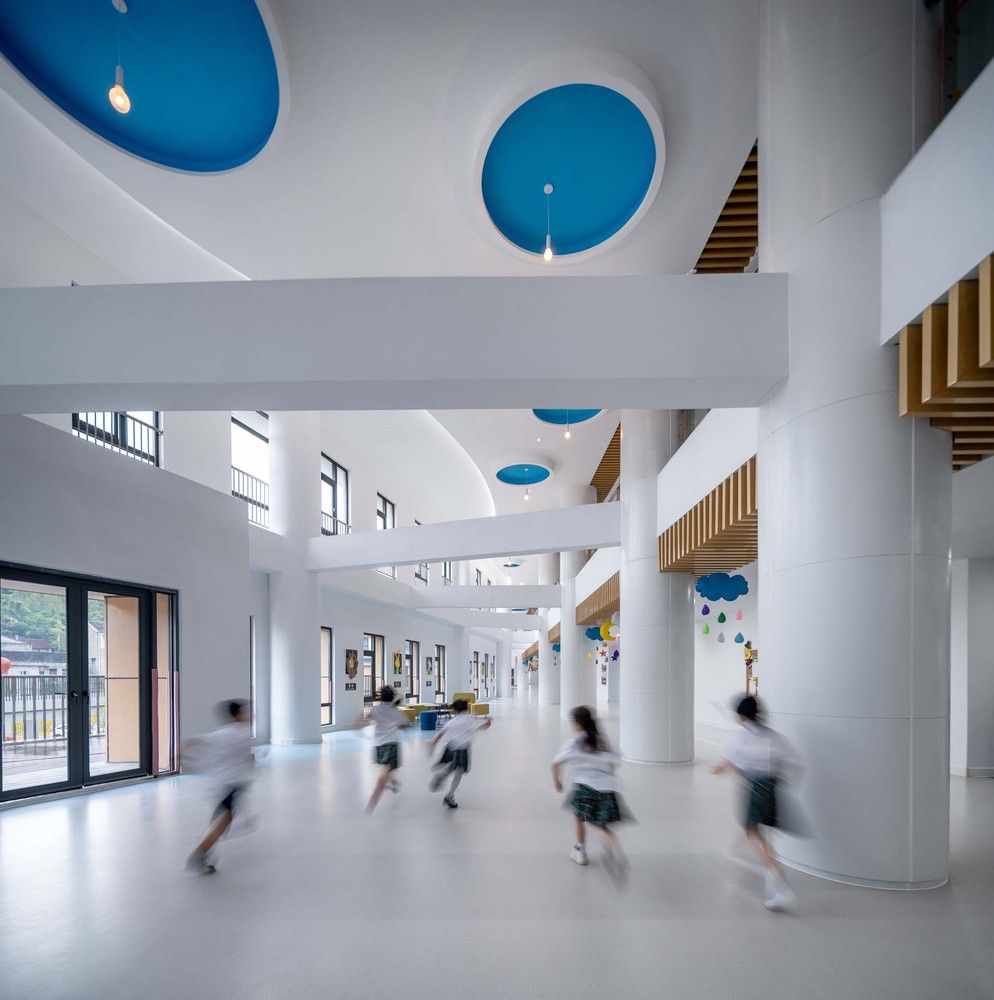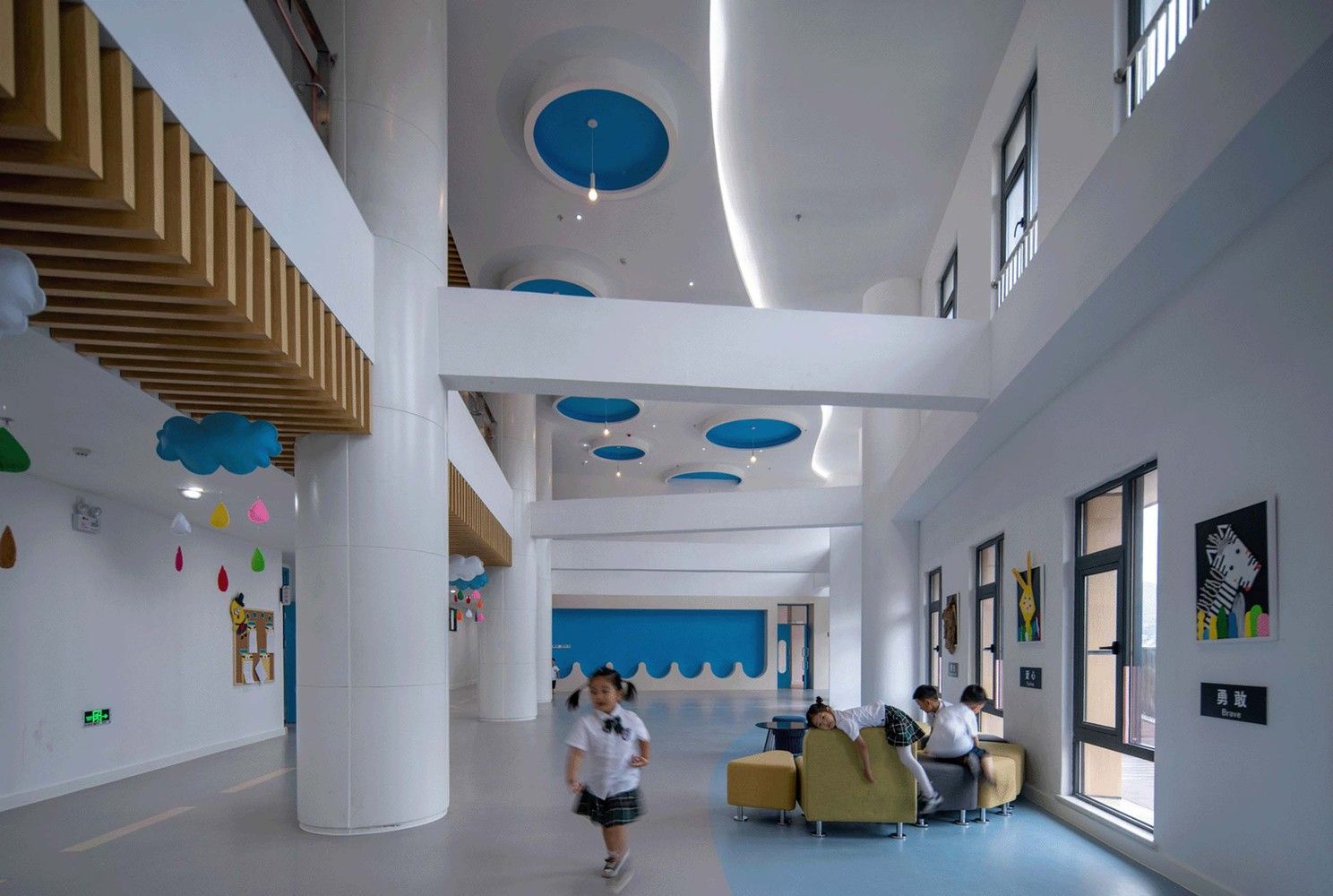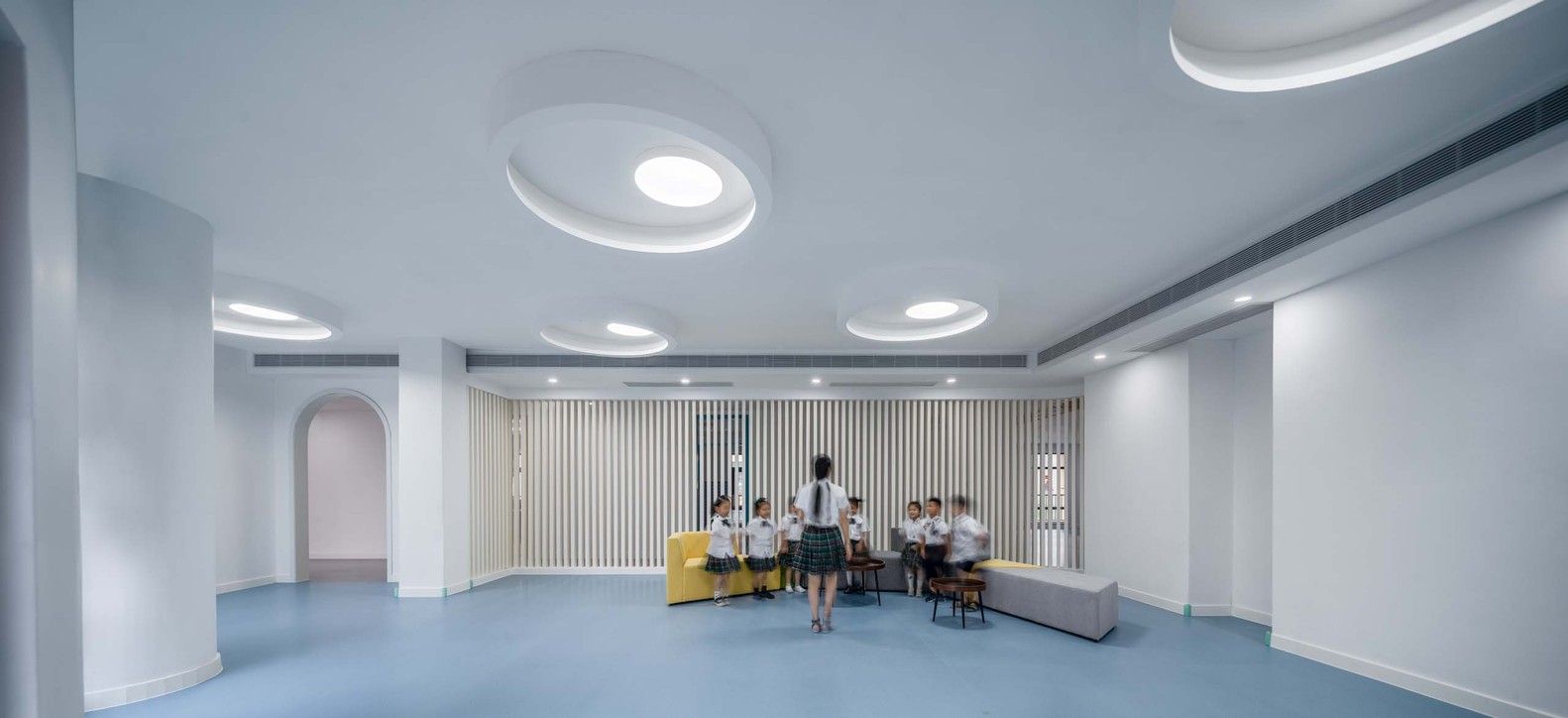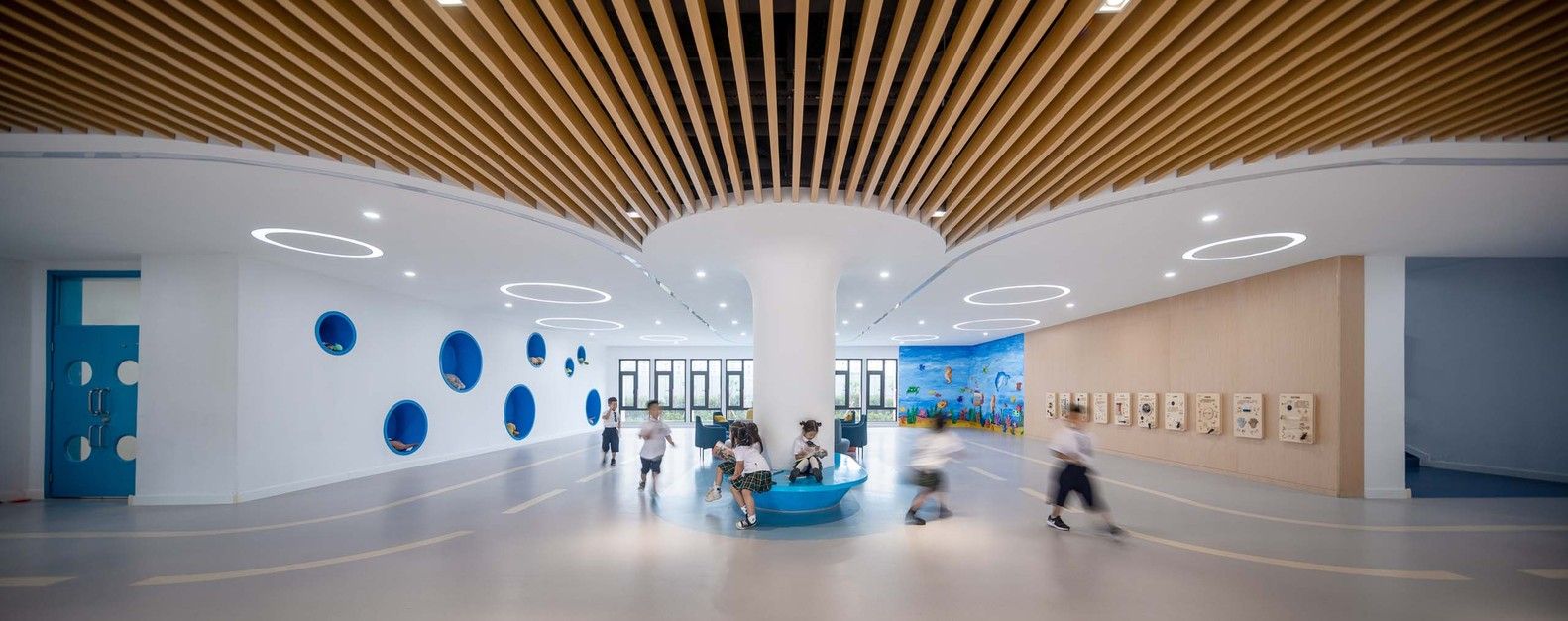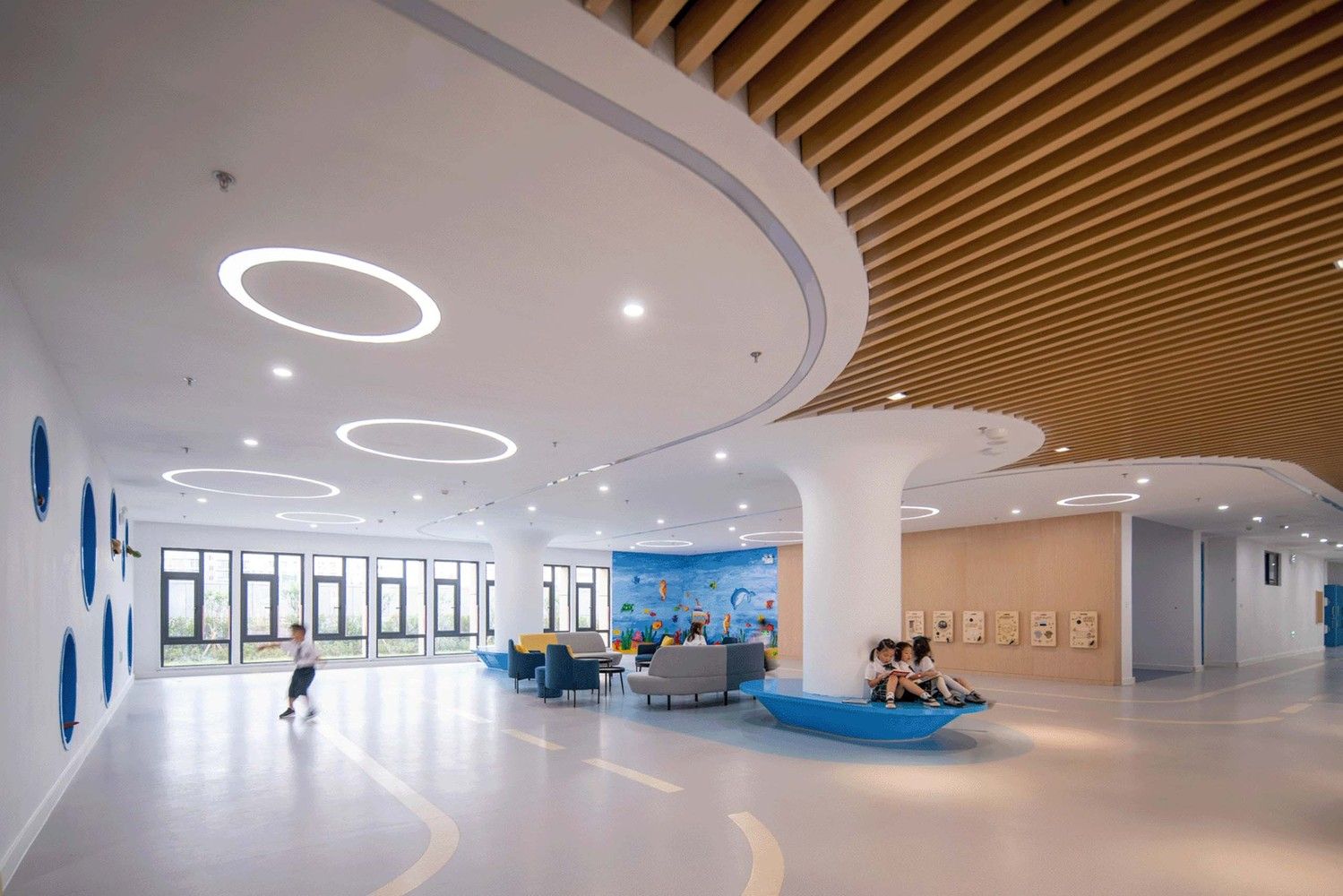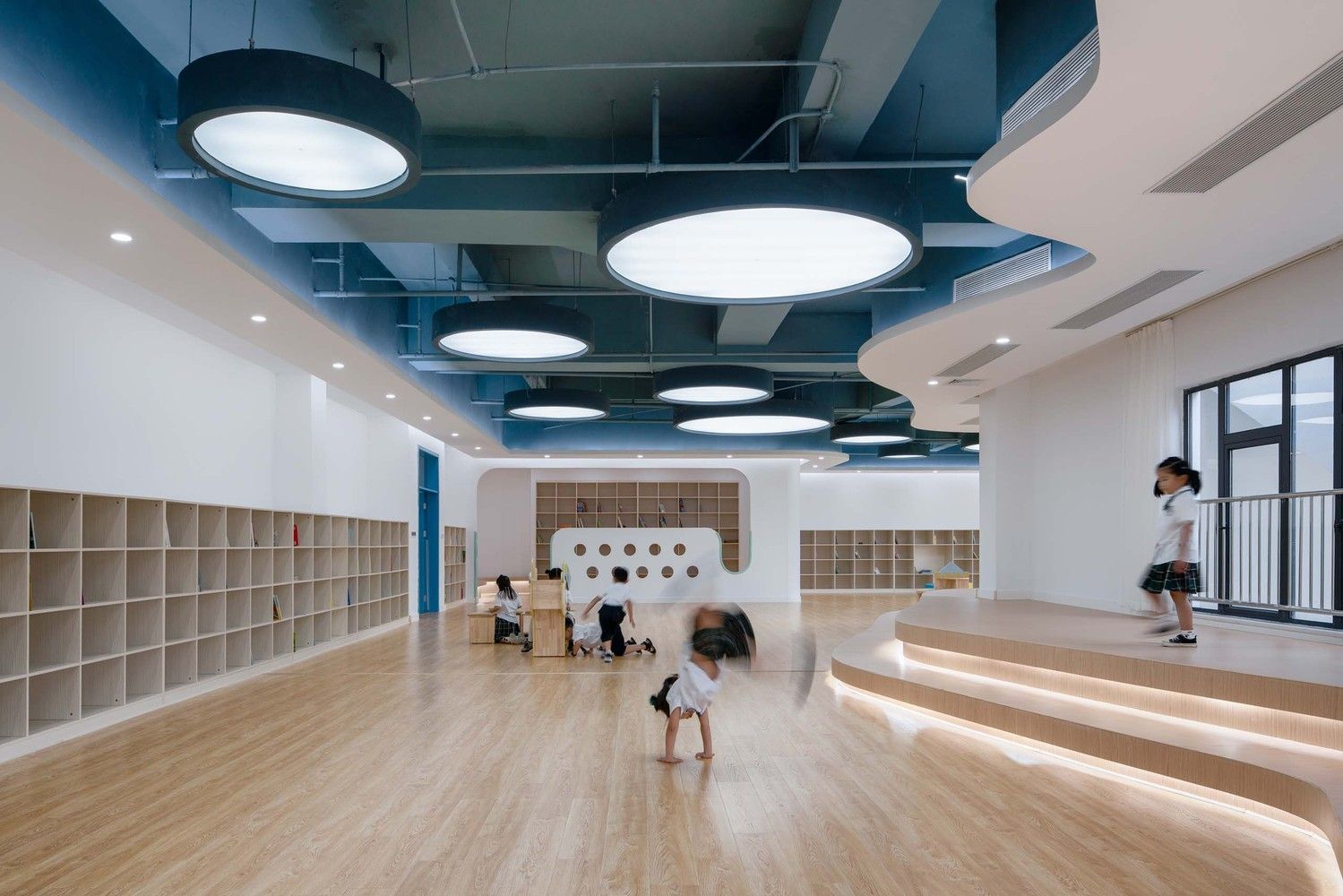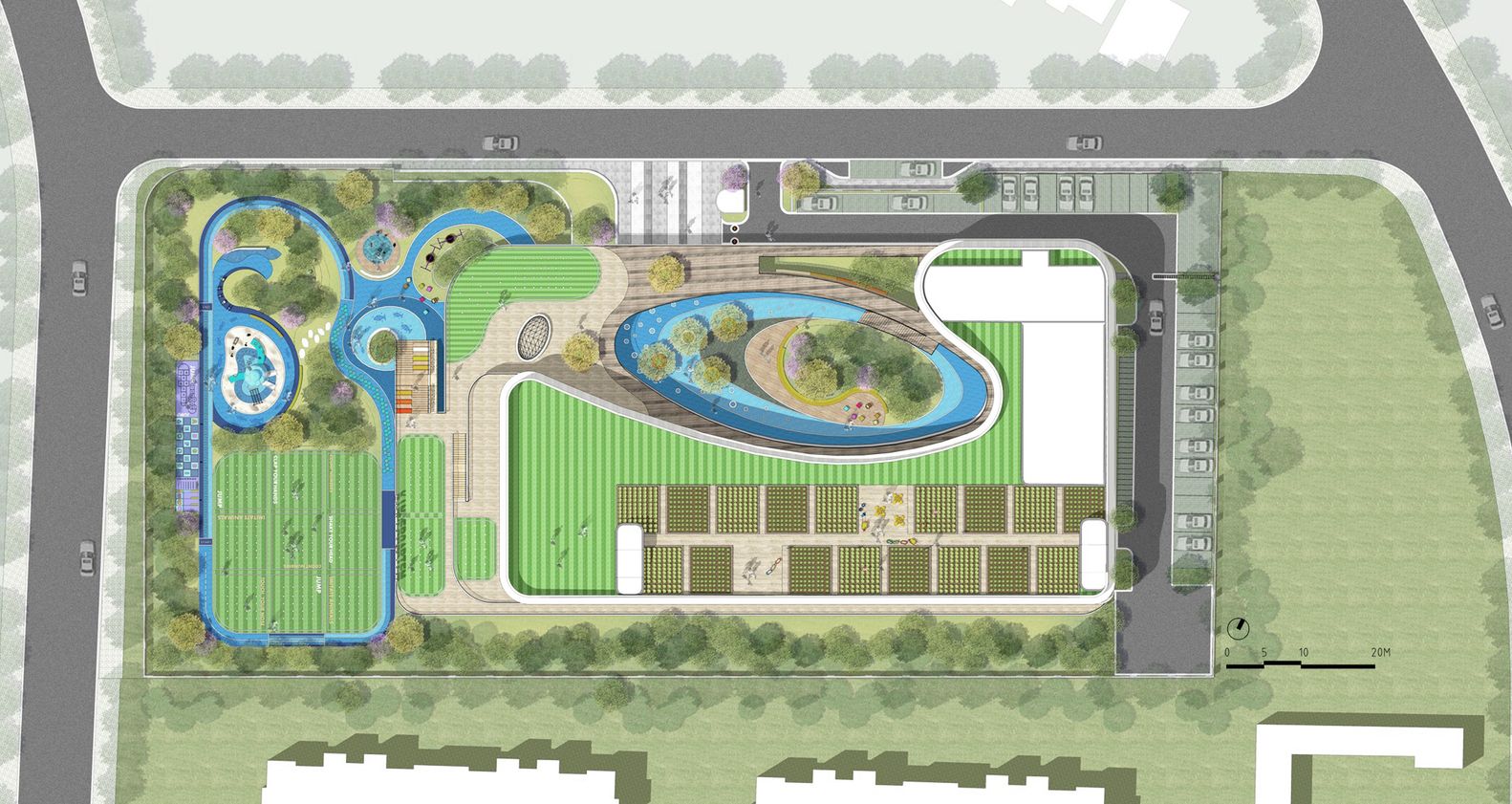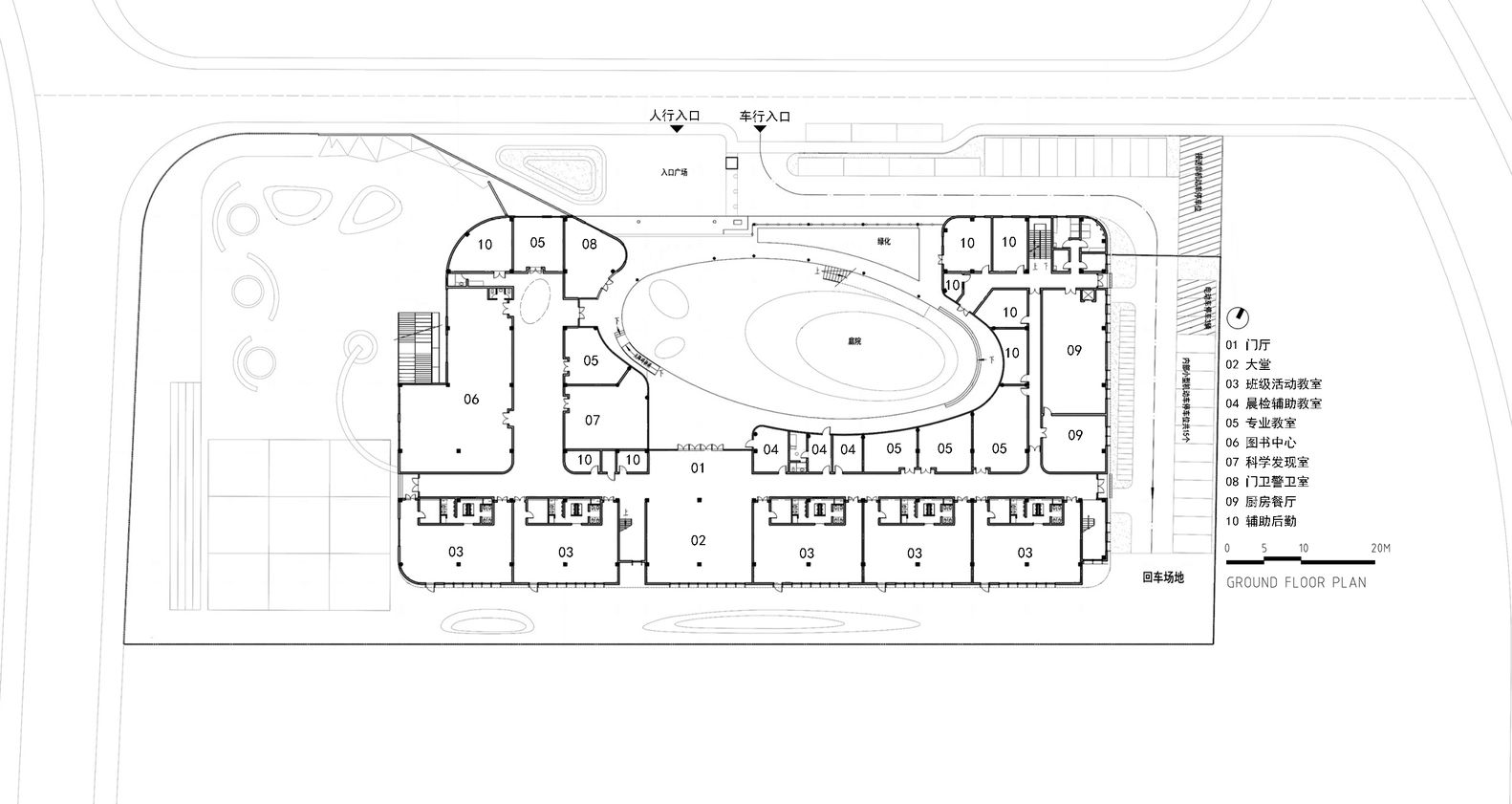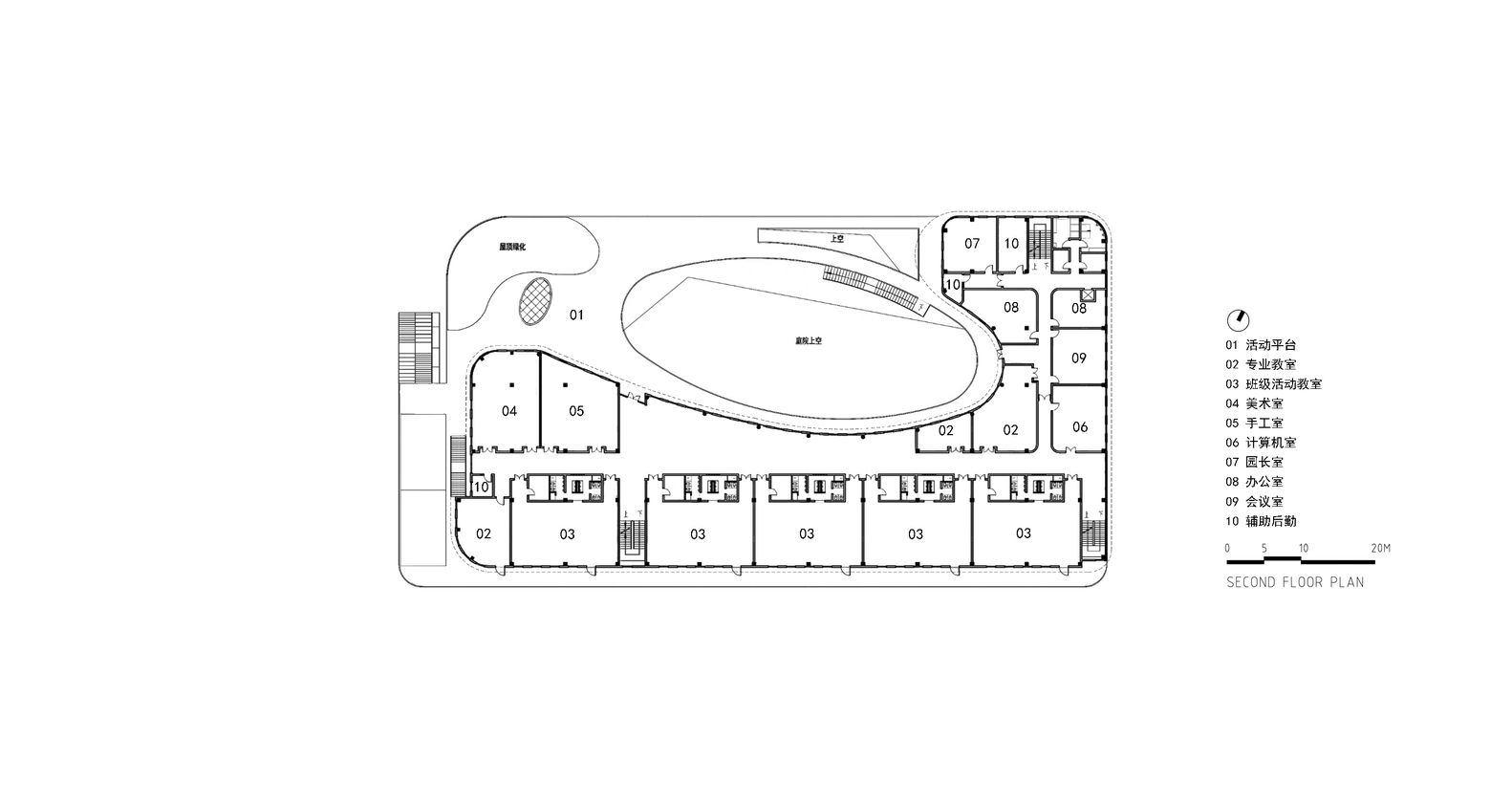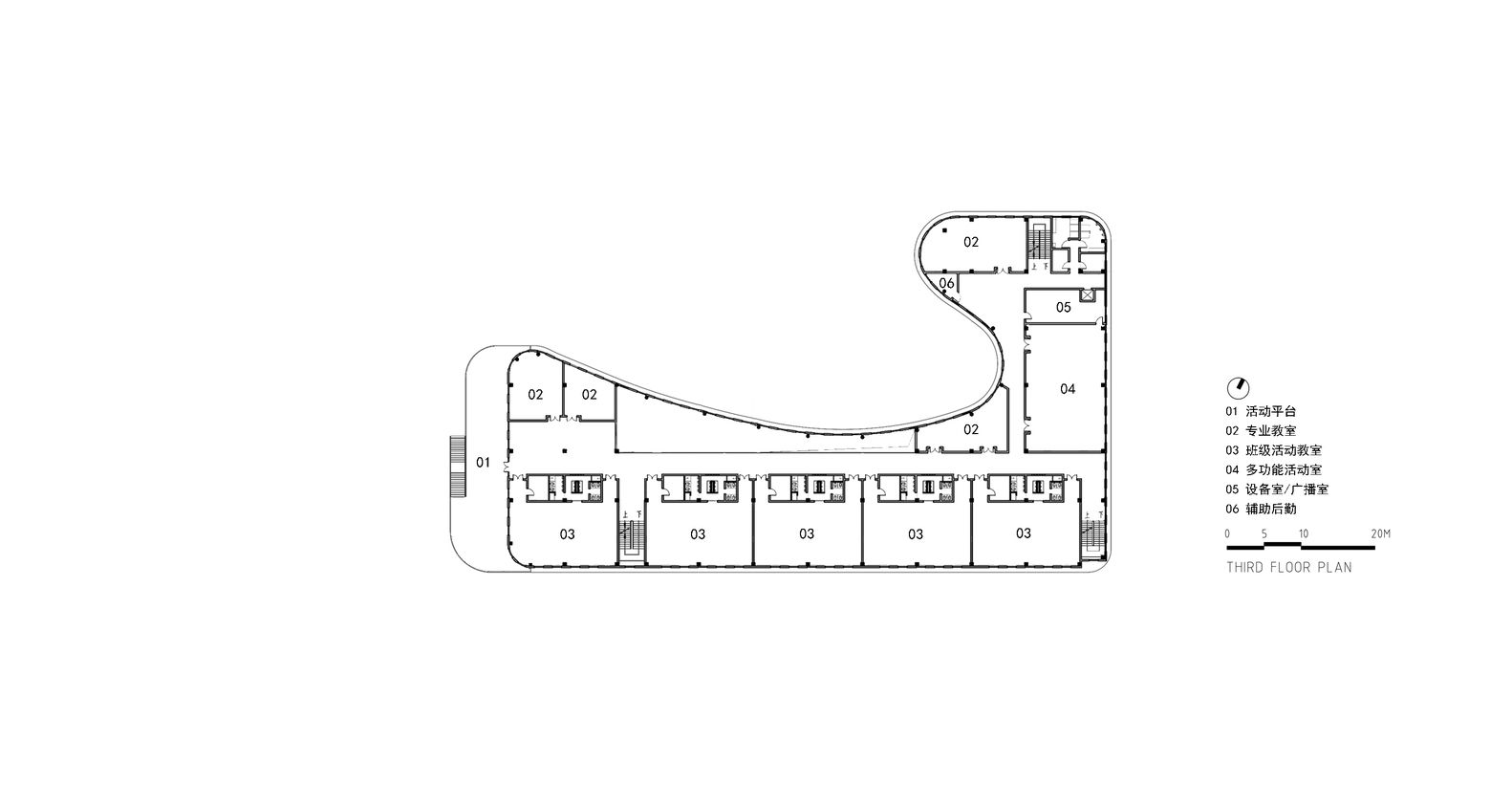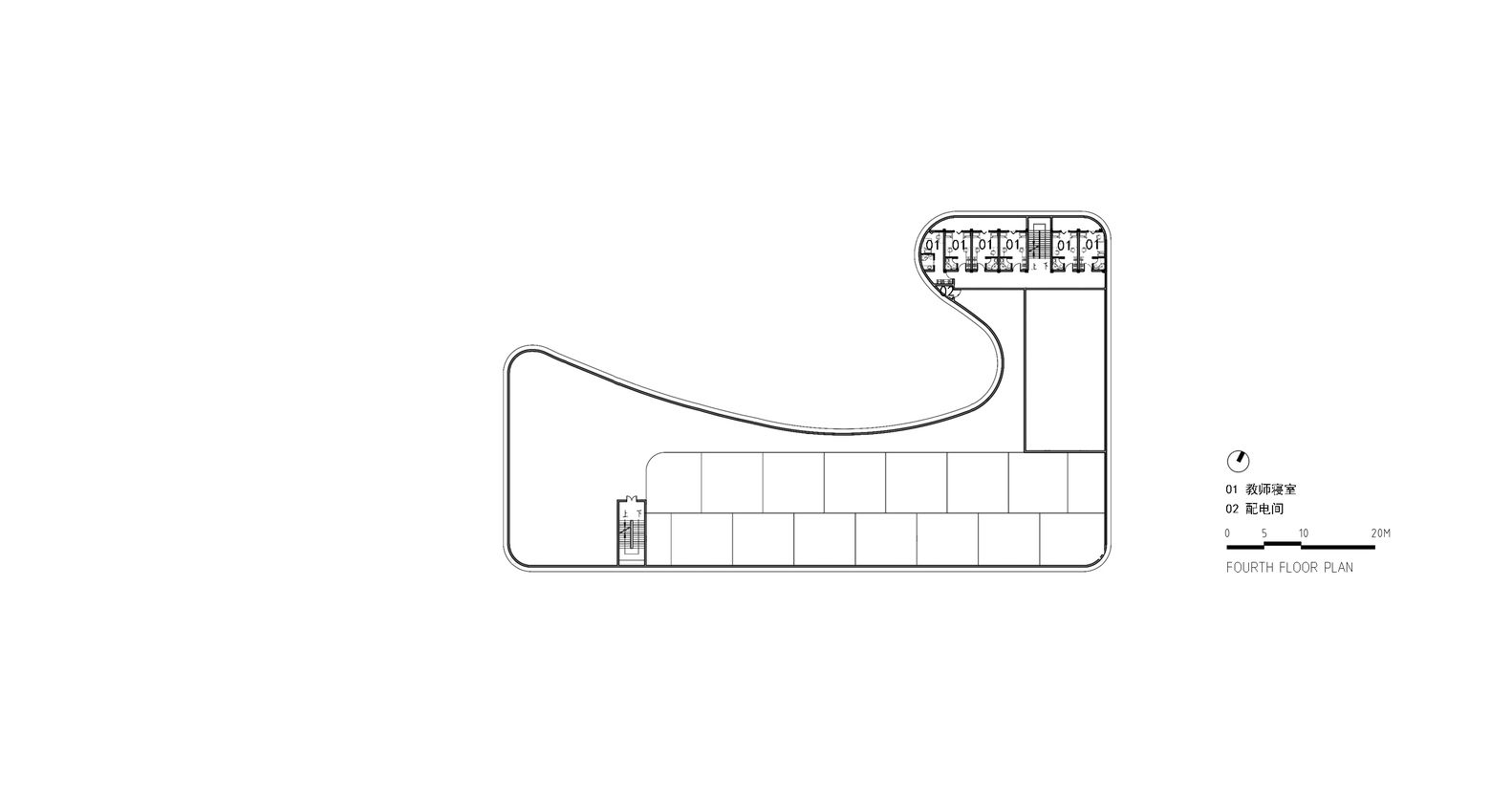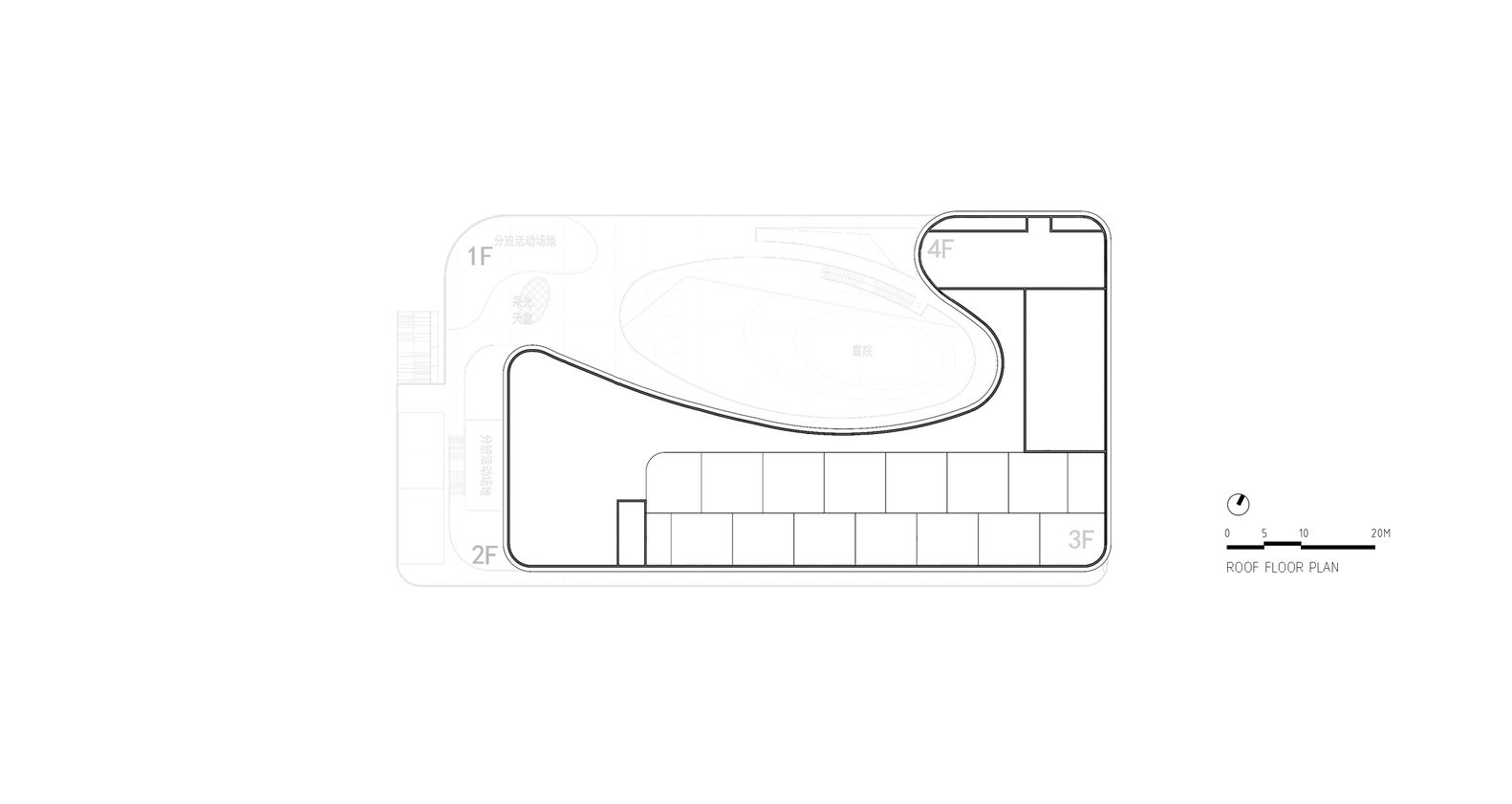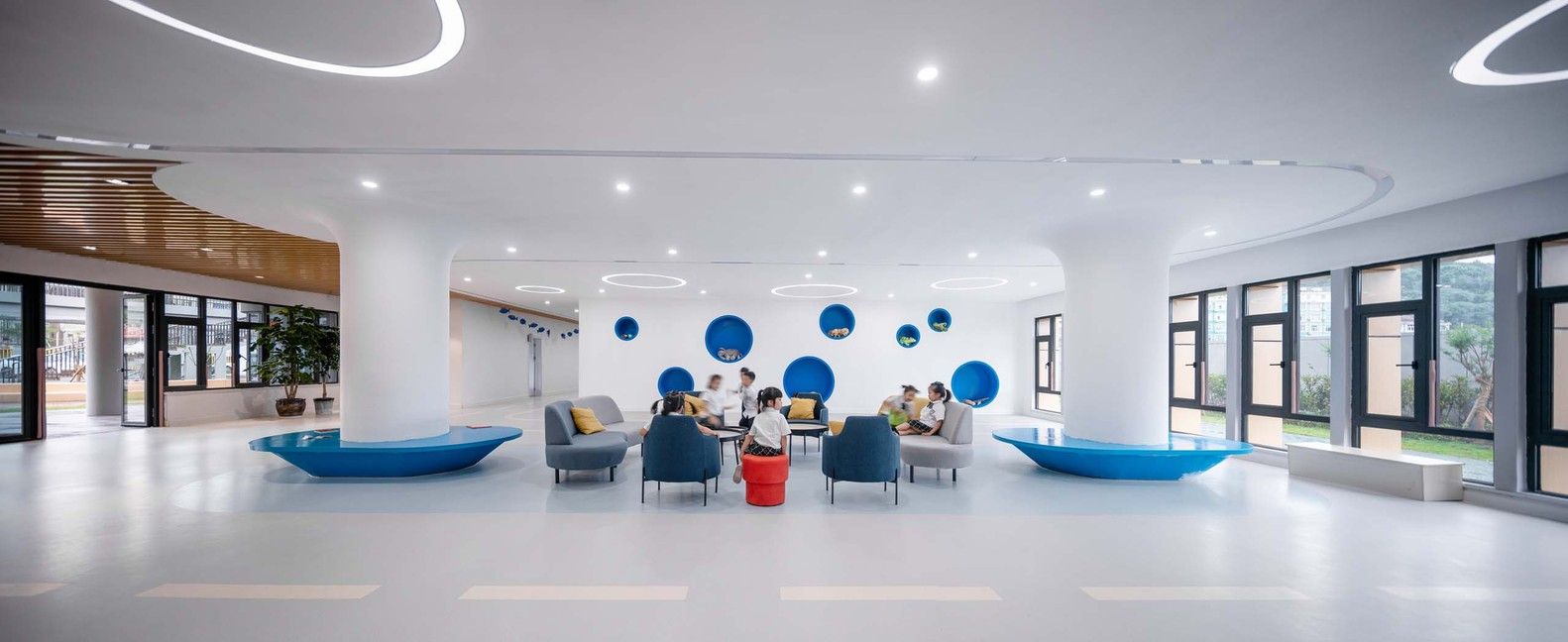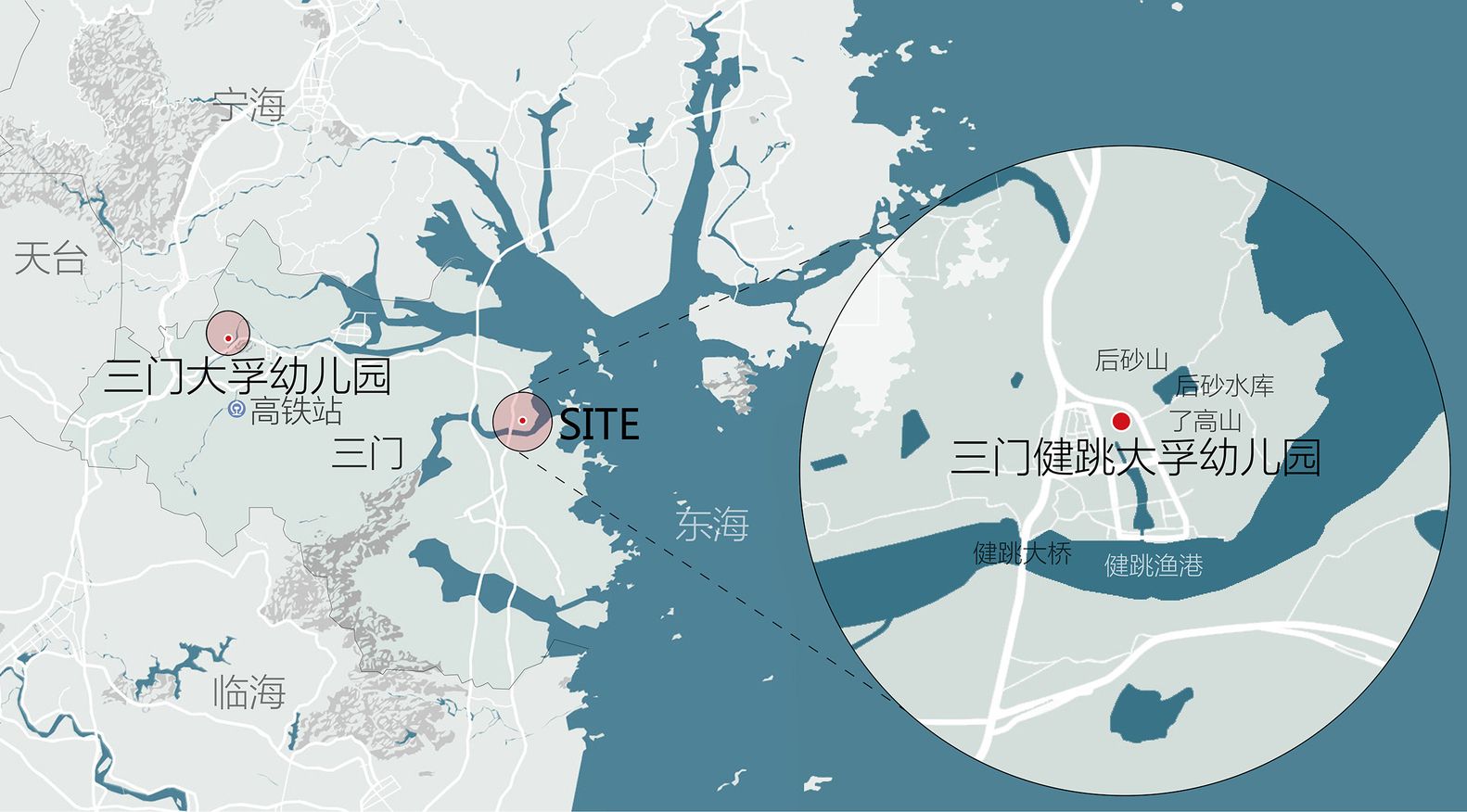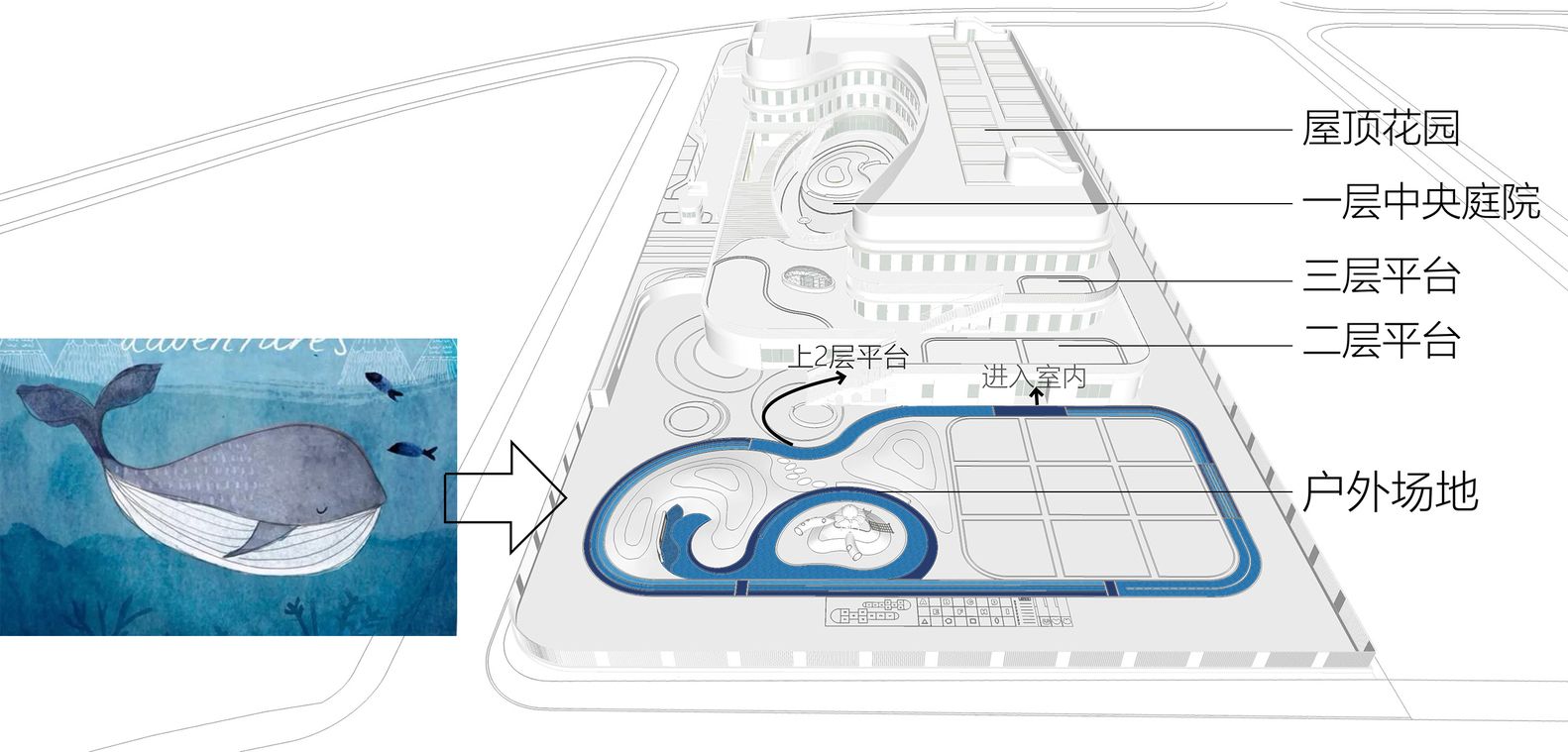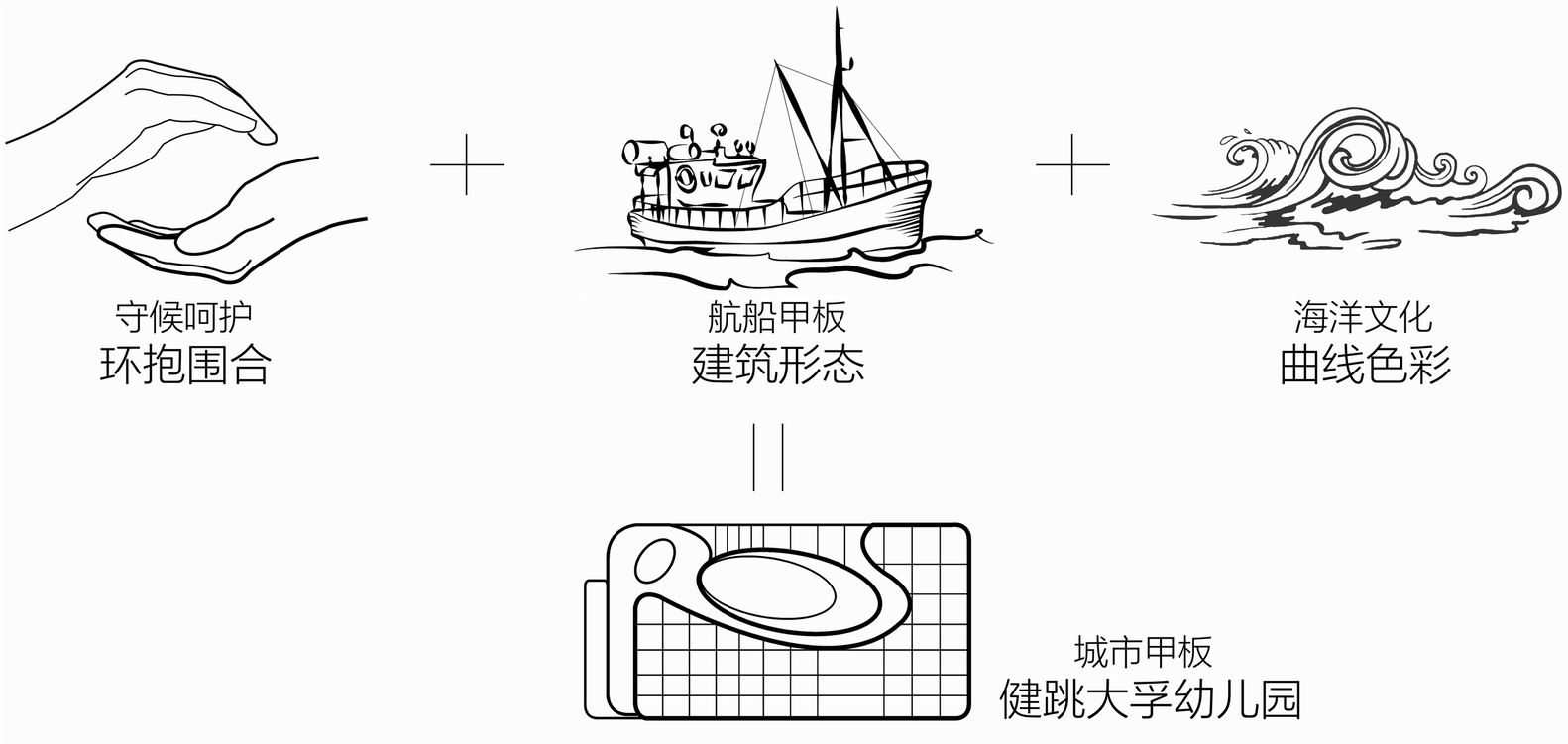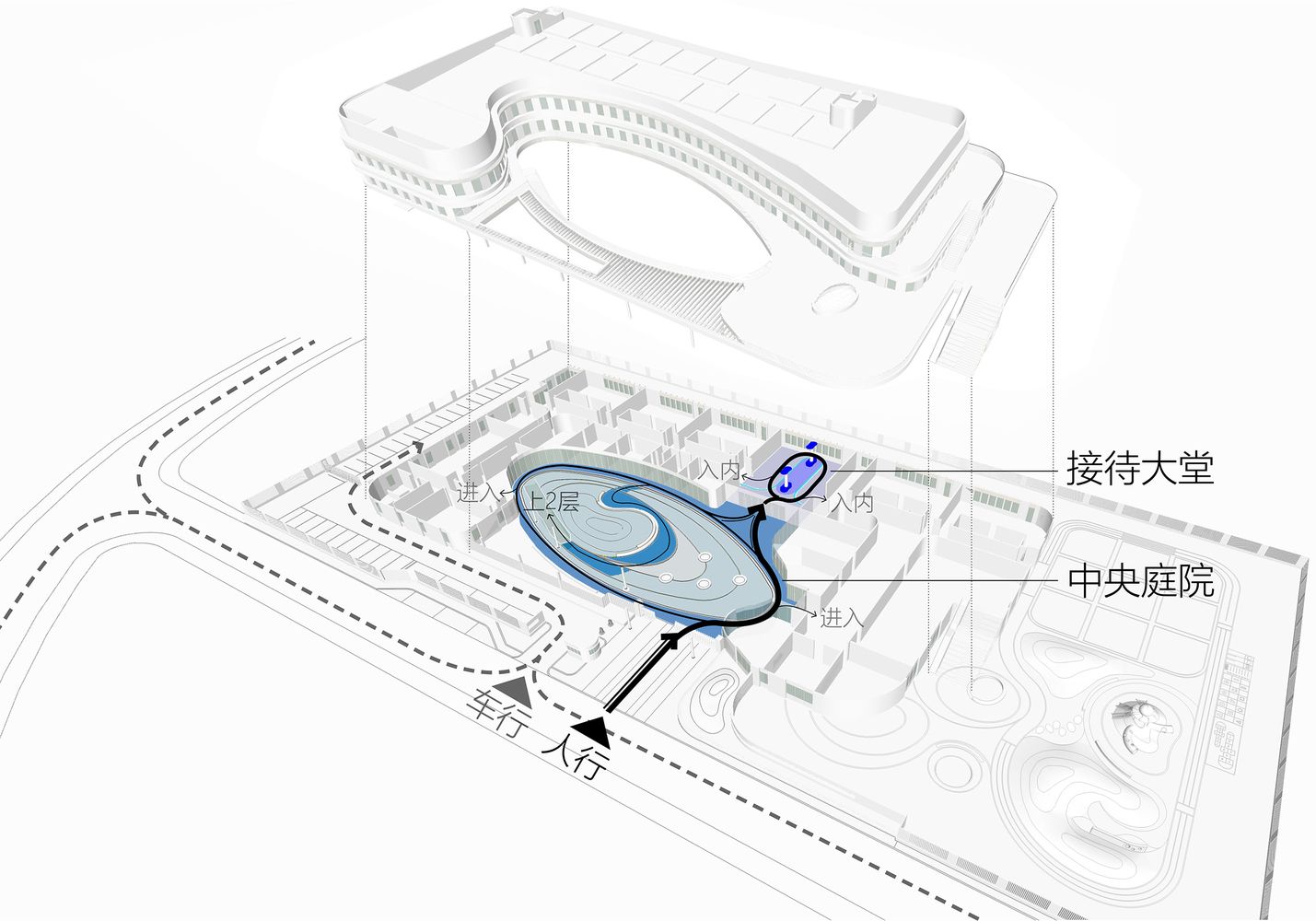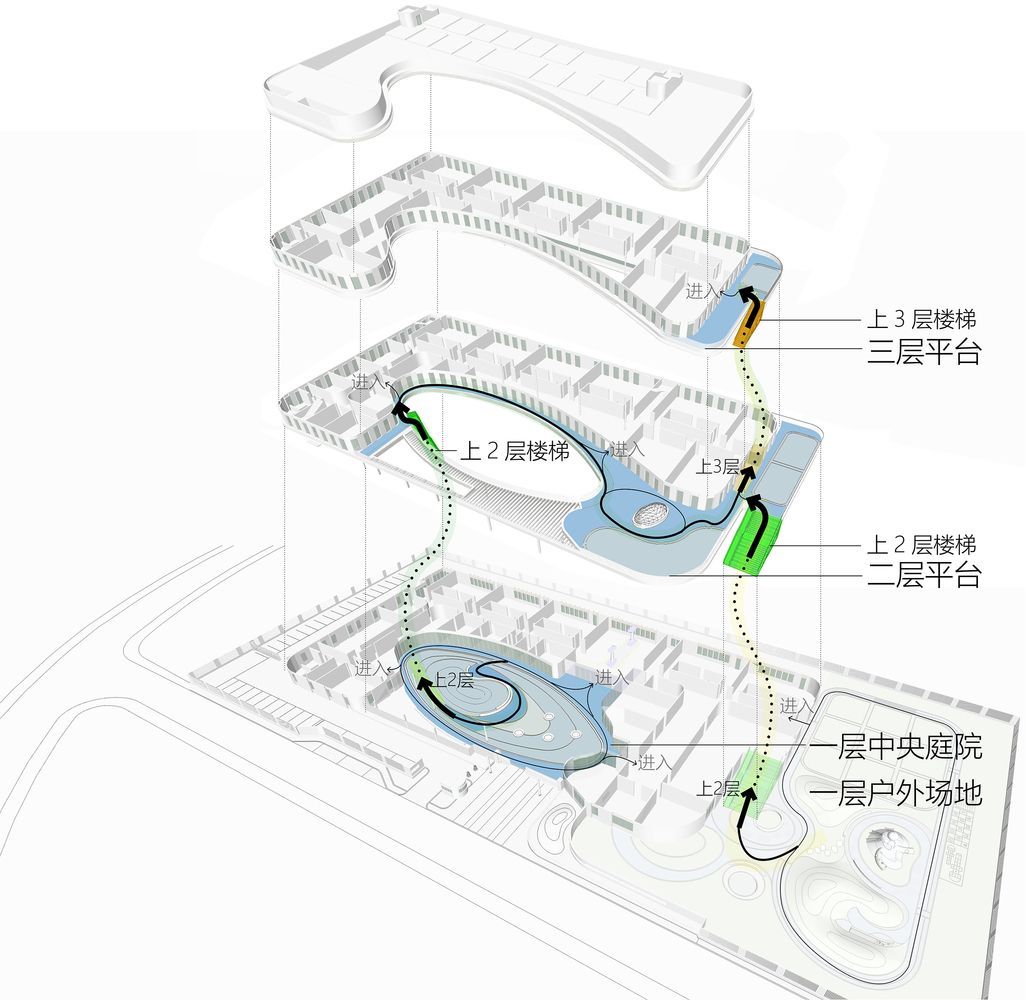Sanmen Jiantiao Dafu Kindergarten’s Concept:
In 2019, the first marine-themed kindergarten of the “Dafu by the Sea” series of campuses landed; this year, the story of “Dafu by the Sea” unfolded once again. In this charming seaside town, the second marine-themed kindergarten greeted The arrival of the children. In the name of the ocean, we integrate the most sincere and simple thoughts into the design and use appropriate design and comfortable space to explain the growth of children.
One- Dafu by the sea
In 2017, the Sixu design team was invited to participate in the design of a series of kindergartens in Sanmen, Taizhou, operated by Shanghai Jiaotong University Education Group and invested by Taizhou Shefa Group. Sanmen is a beautiful and quiet seaside town.
We extracted design inspiration from marine elements and defined a common theme for this series of kindergartens-“Dafu by the Sea”, creating a series of marine campuses in the same vein. Jiantiao Dafu Bilingual Kindergarten is the second in the series, located in Jiantiao Town, Sanmen County, a scenic coastal town.
Jiantiao is known as the “land of fish and rice” and “sea country and mountain city”. Its west is surrounded by low mountains and undulating hills, while the east is vast and flat like a mirror. In such a unique seaside town, nature’s unique care for her is evident everywhere. Every morning, the sky gradually shimmers, and the faint morning mist envelopes the mountains and seas, clouds and mists, hazy sea and sky, beautiful as poetry.
Two-looking out at the sea from the deck of the ship
Upon first seeing the topography of the park, the biggest problem facing designers is how to create the most reasonable spatial layout in a limited space. This roughly rectangular garden needs to be equipped with 15 classes and abundant shared activity space on its 9600㎡ land area.
On the basis of no major adjustments to the original topographic structure, the design strategy designed the garden as a platform regressing from top to bottom, creating a softly surrounded central courtyard. The continuous green space site is the connection between the whole kindergarten and nature, which not only improves the lighting environment of the whole garden but also gives children the space to run naturally.
On the premise of demanding and satisfying functions, this stepped structure building, which is gradually extended downwards, has a volume of 7,800 square meters. Afterward, combining themes and introducing local geographical features, the design is based on the marine culture of Jian Jump, taking the structural representation of the marine civilization closest to humans for thousands of years-the deck as the “identity” of this school.
In the concept of ship and board to form the architectural form, the concept of “deck on land” is further used to give this school a brand new image-“deck overlooking the sea”. On the journey of taking children to sail freely and broaden their horizons, the solid deck under the feet is the most secure and reliable place for children. Therefore, a “city deck to sail” was born.
Three-from the garden into the cabin
In order to ensure the safety of the children to the greatest extent, the park adopts a traffic flow system that separates people and vehicles and separates movement and statics. The pedestrian entrance is a spacious gathering place, where children bid farewell to their parents and walk into the garden. What they see is an oval circular central green courtyard space. As the most not negligible area in the entire park, it has the effect of strengthening agglomeration and is the inner core of the building.
The flow path of the central courtyard is outlined by grass and wooden platforms. Each floor of the building is set up with interactive travel experience paths, connecting the courtyard and the indoor space. This externally enclosed and internally free space allows children to enhance the spatial logic and sense of orientation, feel the intimacy and connection of the group, and perceive the ground and self in the energy endowed by the building. Relationships, inspire more unconstrained thinking. The circular route through the garden can guide the children into the lobby of the garden.
Four-curved waves and bright runways
The lobby design is abstracted and deformed based on the image of the cabin. The space is safe and transparent, and the light is full and soft. This is a place for teachers, students, and parents to rest and stay, and it is also a stage with a sense of flow.
Children can play interactive games around the columns. The curved light strip on the top echoes the arc on the ground, extending the sense of interior space and a sense of peace of mind. The round light on the top and the circular hole on the wall is a metaphors for the bubbles in the sea. The childlike and deep design. It is also a unique tribute to marine culture.
In the garden, in addition to the playing and lecture venues, another indispensable area-the multifunctional room and the reading room. In this space, the design uses the curve of the waves to hide the abruptness of the L-shaped corners in conventional buildings, and the warm and moist feeling of the raw wooden materials creates a simple and intimate atmosphere. The irregular placement of the bookshelves, placed at a height that children can easily reach, and learning and growing in entertaining and fun, is the best interpretation of this space.
The interior design of the garden also implements the marine theme, and the overall space design is extremely simple and focused on details.
In terms of color and material considerations, the base tone is to render the calm white and ecological and natural wood color, and the original flavor restores the unique natural beauty; the ground, wall, and soft decoration adopt the light sea blue that fits the environmental theme, which naturally reveries The interior of the building lingers.
When the weather is fine, the sun accompanies the sea breeze to refract mottled light and shadow on the wall, making the space bright, clean, and full of imagination.
The design utilizes all conditions and introduces natural lighting. In the building corridor on the first floor of the garden, a patio is opened to welcome the natural light from the upper part, conceal the boundary between indoors and outdoors, and give the corridor a sense of transparency.
In the high atriums on the second and third floors, a large area of floor-to-ceiling windows is arranged on the side, and the halo at different times of the day is projected into the space, and the changing light and shadow created to make the atmosphere full of vitality and a sense of future. Some interesting small-scale spaces are embedded in the wall. In this bright and pure small world that simulates the abstract form of seawater, children can run and play freely, and imagination is born.
Five-walking between the various decks
The architectural form that wraps the central courtyard on the first floor is stepped back, creating a multi-level activity platform space. Outdoor stairs are arranged in different positions on each platform to integrate the functions of traffic and activities.
The permeability of the upper and lower floors is enhanced by the visual and traffic flow lines, and a three-dimensional outdoor playground is constructed for the children. It has both an open space suitable for running and jumping, and an inviting winding path.
The spacious corridors and platforms enrich the activity attributes and combine with the staggered public functions to create a rich travel path. The building openings on each floor lead the terrain wind from the seaside into the room and combined with the side skylights, the entire garden forms a comfortable microclimate with good natural ventilation and lighting.
Six-define the courtyard with a whale
On the west side of the garden, a large outdoor venue carries the functions of exploration and sports. The design uses a “whale” to define the large outdoor area on the west side of the garden. The natural grass and plastic floor are combined.
Children will inadvertently find carefully prepared marine-themed facilities sketches, sand pits, caves, and blue colors while running. The design of the runway restores the lifestyle of the seaside town. Abundant and interesting sports facilities guide children to climb, slide or dance with the wind.
When the wind was clear and the sun was warm, the children played on the “deck”. The limitations of the building space seemed to disappear. The children ran on their own land, feeling the breeze blowing and enjoying the breath of the sea.
Seven-embrace the child with soft lines
Complementing the “urban deck” is the soft wrapping of the kindergarten’s architectural design. The whole garden is half-enclosed by a multi-story building to form an inward space, so that children can avoid external noise when they live, play and study in the garden.
The white plaster used on the main exterior wall of the building is simple, environmentally friendly and energy-saving, and can bring more brightness to the overall space. The middle is supplemented by dark gray horizontal lines, which are in sharp contrast with the white main tone, and dotted with a little bright color, adding dynamic vitality to the garden.
The uniform and neat window positions on the building facade form a transparent and interesting relationship between indoors and outdoors, ensuring the maximum time of sunshine in the building. The richly-layered buildings fully and effectively divide the functions of the garden.
The entrance plaza on the north side, the outdoor field on the southwest side, the naturally generated entrance green space, the layered aerial activity space, and the roof activity platform allows children to be able to play in the building. Shuttle and run safely in the middle, just like looking at the opposite bank on the deck, enjoying new scenery anytime, anywhere.
Eight-Give children a kindergarten that can carry memories
The kindergarten is not only a pure teaching space but also a transitional place for children from a small home to the big world. It is also a precious container for carrying their most worry-free childhood memories. We use artistic abstraction to extract the child’s first natural memory of life on this land, implement every space and detail in the garden, and use natural association to inspire children to think about space.
Looking forward to this kindergarten, as the “deck” for children’s lifelong voyages that adhere to the natural imagination and creative talent of caring for children. Sanmen Dafu Jumping Bilingual Kindergarten is the second of the “Dafu by the Sea” series of gardens, and it is also a practical case of our way of exploring the use of these concepts to create an integrated garden design.
We emphasize the integration of local culture and regional characteristics into the interior and exterior of the building and use professional one-stop design to create an integrated garden. The further vision is to increase the influence of campus buildings through integrated design, and realize the form of dots and areas into a network, thereby gradually changing the face of education in the entire city. Use appropriate design and comfortable space to explain the growth of children. We have been working hard to practice.
Project info:
Architects: Think Logic Design
Project type: Educational, KINDERGARTEN
Location: Taizhou, China
Area: 9600 m²
Year: 2020
Photographs: Qingshan Wu
Manufacturers: 东芝, 全通, 兴发, 台州宏发, 多乐士, 恒洁, 欧普, 永固为华, 洁福, 海康, 莫干山, 西门子, 赋烁, 马克波罗, 龙牌
© Qingshan Wu
© Qingshan Wu
© Qingshan Wu
© Qingshan Wu
© Qingshan Wu
© Qingshan Wu
© Qingshan Wu
© Qingshan Wu
© Qingshan Wu
© Qingshan Wu
© Qingshan Wu
© Qingshan Wu
© Qingshan Wu
© Qingshan Wu
© Qingshan Wu
© Qingshan Wu
© Qingshan Wu
© Qingshan Wu
© Qingshan Wu
© Qingshan Wu
© Qingshan Wu
© Qingshan Wu
© Qingshan Wu
© Qingshan Wu
© Qingshan Wu
© Qingshan Wu
© Qingshan Wu
site
1F plan
2F plan
3F plan
4F plan
RF plan
north elevation
south elevation
west elevation
east elevation
Section
Section
Photography © Qingshan Wu
Concept
Design concept
1F circulation
vertical circulation


